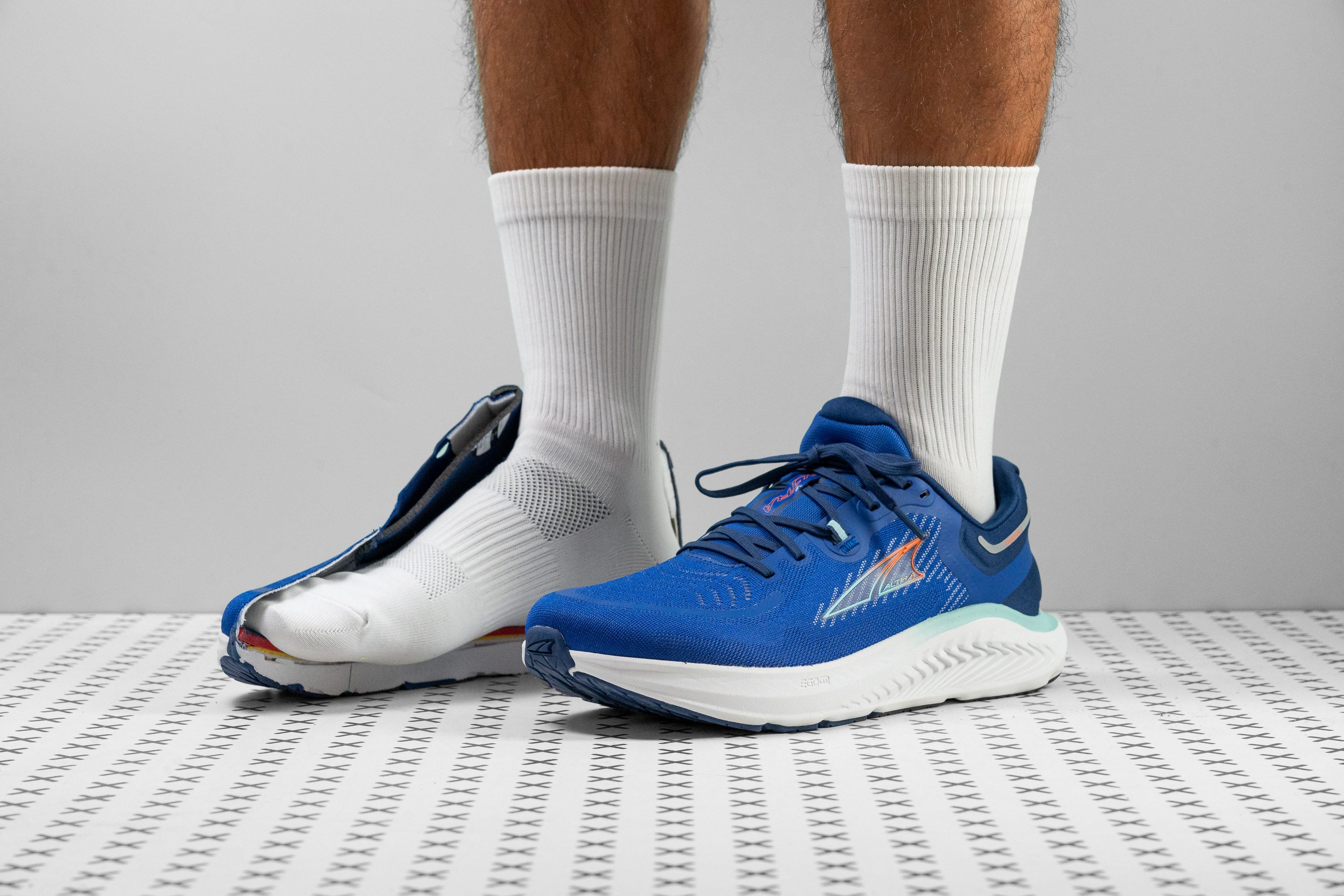Our verdict
Pros
- Exceptional space for toe splay
- Highly stable and supportive
- Really light
- Innerflex technology promotes natural midfoot striking
- Outstanding durability
- Versatile for walking or gym use
- Genuine zero-drop design!
- Dependable grip
Cons
- Becomes uncomfortably firm and stiff in cold weather
- Priced on the higher end of the spectrum at $170
- Not suitable for fast-paced running
- Low energy return
Audience verdict
Comparison
The most similar running shoes compared
+ + Add a shoe | |||||
|---|---|---|---|---|---|
| Audience score | 82 Good! | 85 Good! | 84 Good! | 82 Good! | |
| Price | £145 | £105 | £125 | £150 | |
| Pace | Daily running | Daily runningTempo | Daily running | Daily running | |
| Shock absorption | Low | - | - | Moderate | |
| Energy return | Low | - | - | Low | |
| Traction | High | - | - | High | |
| Arch support | Stability | Neutral | Stability | Stability | |
| Weight lab Weight brand | 9.3 oz / 264g 9.8 oz / 279g | 8.3 oz / 235g 10 oz / 283g | 9.6 oz / 273g 10.2 oz / 289g | 9.8 oz / 278g 9.8 oz / 278g | |
| Lightweight | ✗ | ✓ | ✗ | ✗ | |
| Drop lab Drop brand | 0.1 mm 0.0 mm | 0.4 mm 0.0 mm | 0.2 mm 0.0 mm | 2.1 mm 0.0 mm | |
| Strike pattern | Mid/forefoot | Mid/forefoot | Mid/forefoot | Mid/forefoot | |
| Size | True to size | Slightly small | True to size | - | |
| Midsole softness | Soft | Soft | Balanced | Soft | |
| Difference in midsole softness in cold | Big | Normal | Normal | Small | |
| Toebox durability | Decent | Decent | Decent | Good | |
| Heel padding durability | Decent | Bad | Decent | Good | |
| Outsole durability | Good | Good | Good | Good | |
| Breathability | Breathable | Moderate | Moderate | Moderate | |
| Width / fit | Wide | Narrow | Medium | Medium | |
| Toebox width | Wide | Wide | Wide | Wide | |
| Stiffness | Moderate | Stiff | Stiff | Moderate | |
| Torsional rigidity | Moderate | Flexible | Moderate | Moderate | |
| Heel counter stiffness | Flexible | Flexible | Flexible | Flexible | |
| Heel lab Heel brand | 27.6 mm 30.0 mm | 28.4 mm 28.0 mm | 26.0 mm 28.0 mm | 29.4 mm 30.0 mm | |
| Forefoot lab Forefoot brand | 27.5 mm 30.0 mm | 28.0 mm 28.0 mm | 25.8 mm 28.0 mm | 27.3 mm 30.0 mm | |
| Widths available | NormalWide | Normal | Normal | NormalWide | |
| Orthotic friendly | ✓ | ✓ | ✓ | ✓ | |
| Season | SummerAll seasons | All seasons | All seasons | All seasons | |
| Removable insole | ✓ | ✓ | ✓ | ✓ | |
| Ranking | #567 Bottom 16% | #221 Bottom 42% | #261 Bottom 31% | #287 Bottom 24% | |
| Popularity | #265 Top 39% | #295 Bottom 22% | #254 Bottom 33% | #164 Top 43% |
Who should buy
In the lab, we think that the Altra Paradigm 7 is an excellent option for:
- Altra enthusiasts seeking a daily training shoe that also provides a stability boost.
- Individuals comfortable with the £170 cost who are interested in making the switch to low-drop running shoes.
- Runners looking to add variety to their workouts with a low-drop shoe, or beginners eager to kick off their running journey on a safe note with a minimalist option.
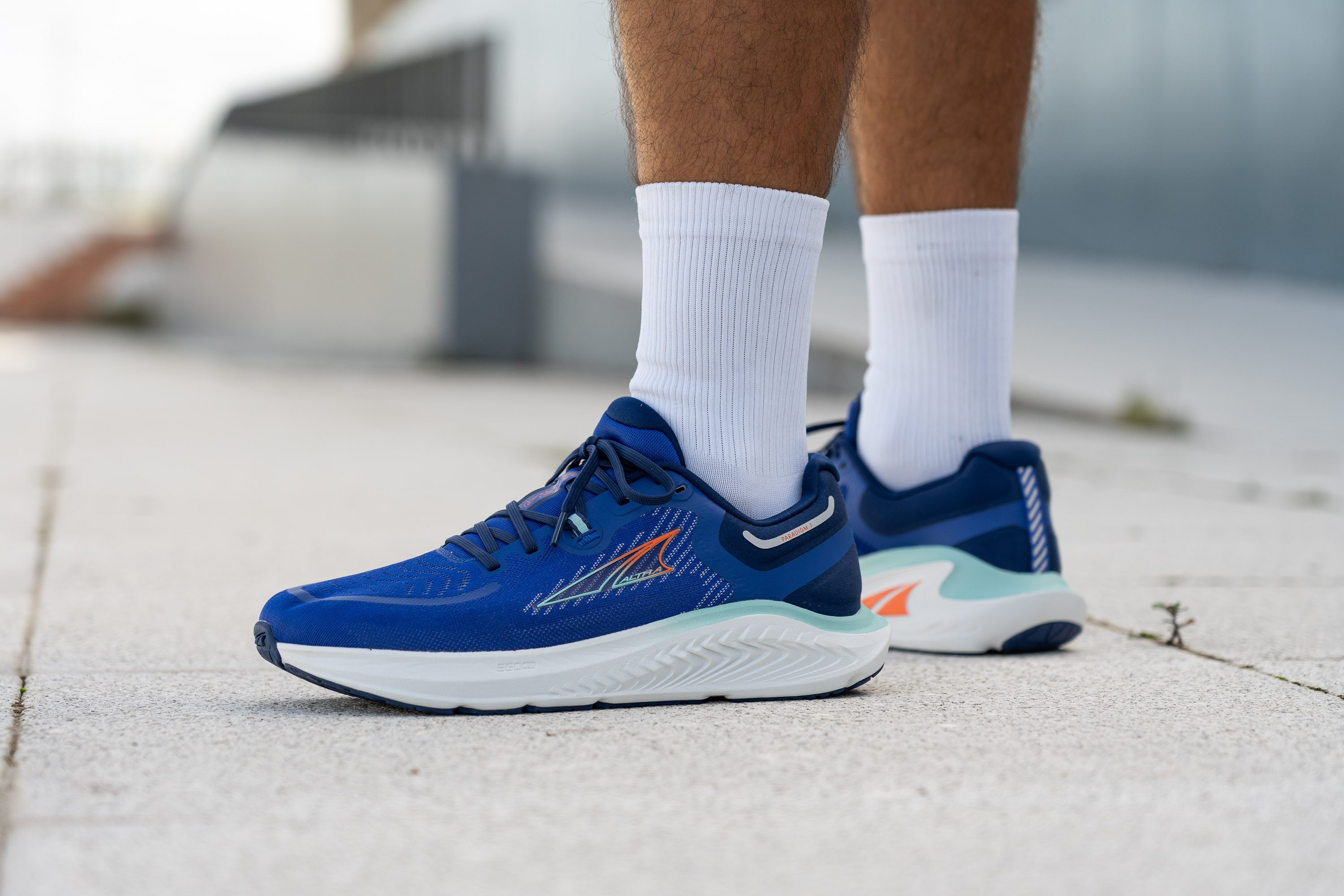
Who should NOT buy
If you usually run in shoes with 4-12 mm of drop, be cautious when switching to zero-drop shoes like the Paradigm 7. A sudden change can easily lead to injury. In our view, you might be better off with a regular daily trainer that also offers stability features, such as the Saucony Tempus or the ASICS GT 2000 11.
If you're looking to go faster or longer, the Paradigm 7 might not be your best Altra option. The Torin 7 is quicker and more agile, although it doesn't offer as much stability.
If you are into marathon training, consider the VIA Olympus. We felt that its rockered shape makes for easier transitions, especially when your legs start to feel tired in the longest runs.
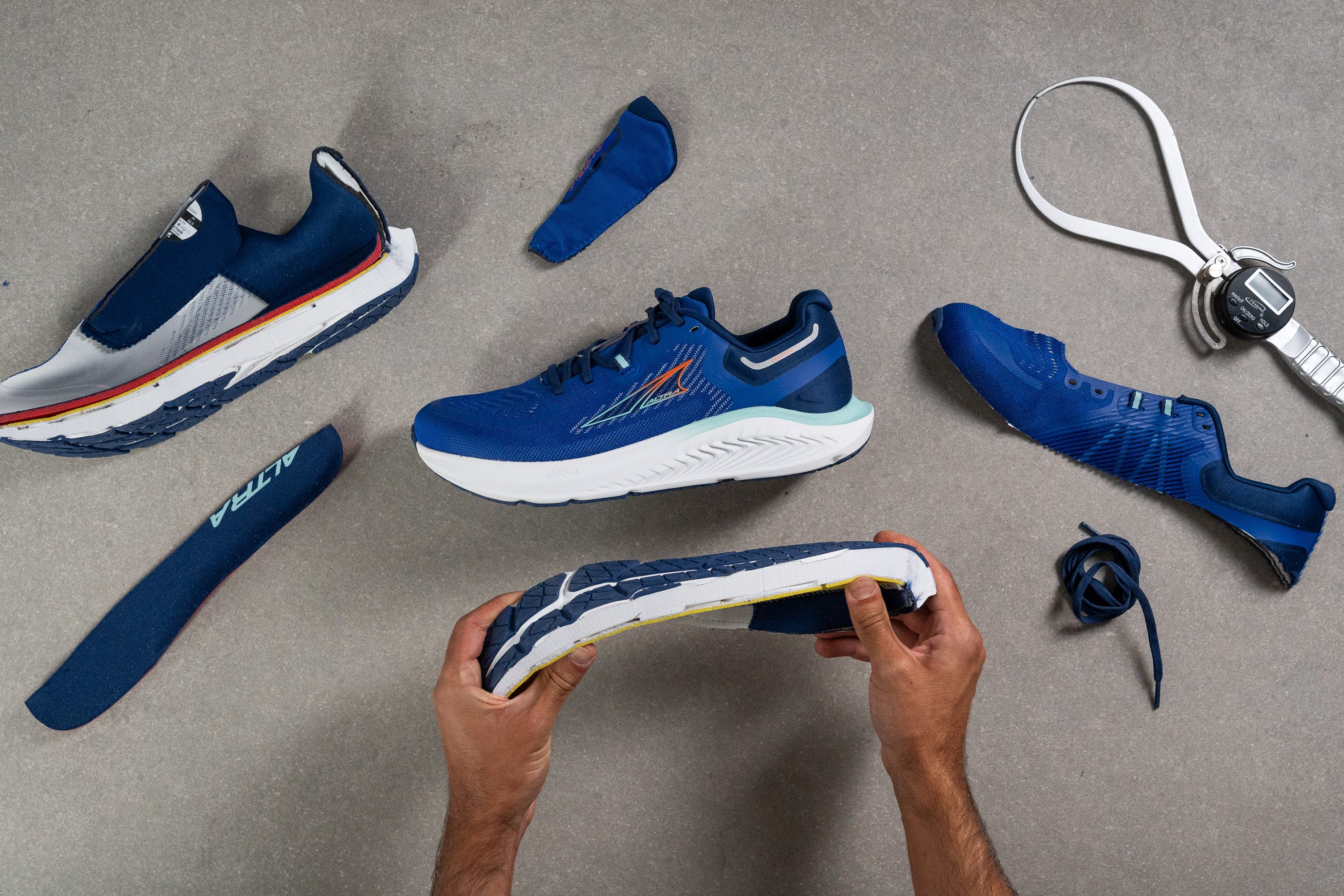
Cushioning
Shock absorption
As a true zero-drop model, the Paradigm 7 delivers identical shock absorption at both ends, with 106 SA in the heel and forefoot. While that may seem underwhelming for heel strikers, it’s actually quite average for forefoot runners, which is an important distinction to highlight in Altra shoes.
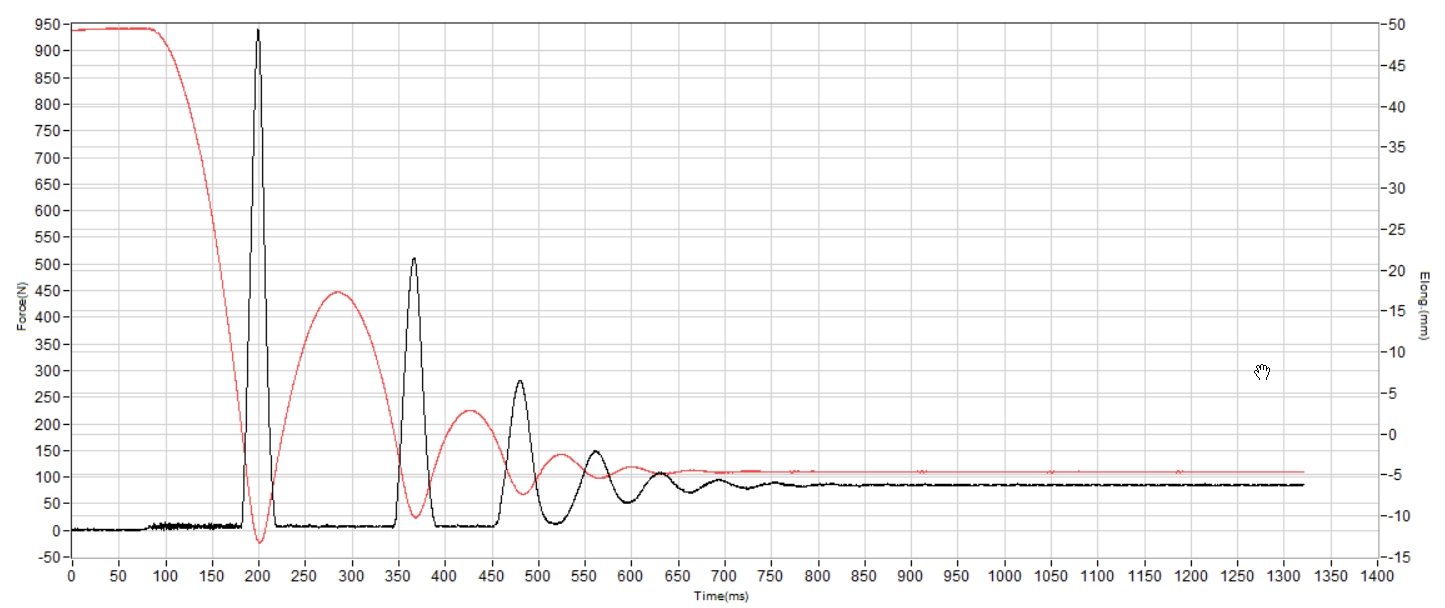
| Paradigm 7 | 106 SA |
| Average | 130 SA |
Energy return
Where this shoe really disappoints is in energy return. While most rely on feel to guess bounce, we can measure it precisely—and the Paradigm 7 only managed 43% in the ASTM F1976 standard. That’s a serious shortfall and definitely something Altra needs to address in version 8.
| Paradigm 7 | 43.0% |
| Average | 58.6% |
Heel stack
The heel of the Paradigm 7 has a stack height of 27.6 mm.
While that might sound low to some people, it's worth pointing out that Altra designs its shoes to be zero-drop. This means they're really made for midfoot and forefoot strikers who don't need a lot of foam at the back of their feet.
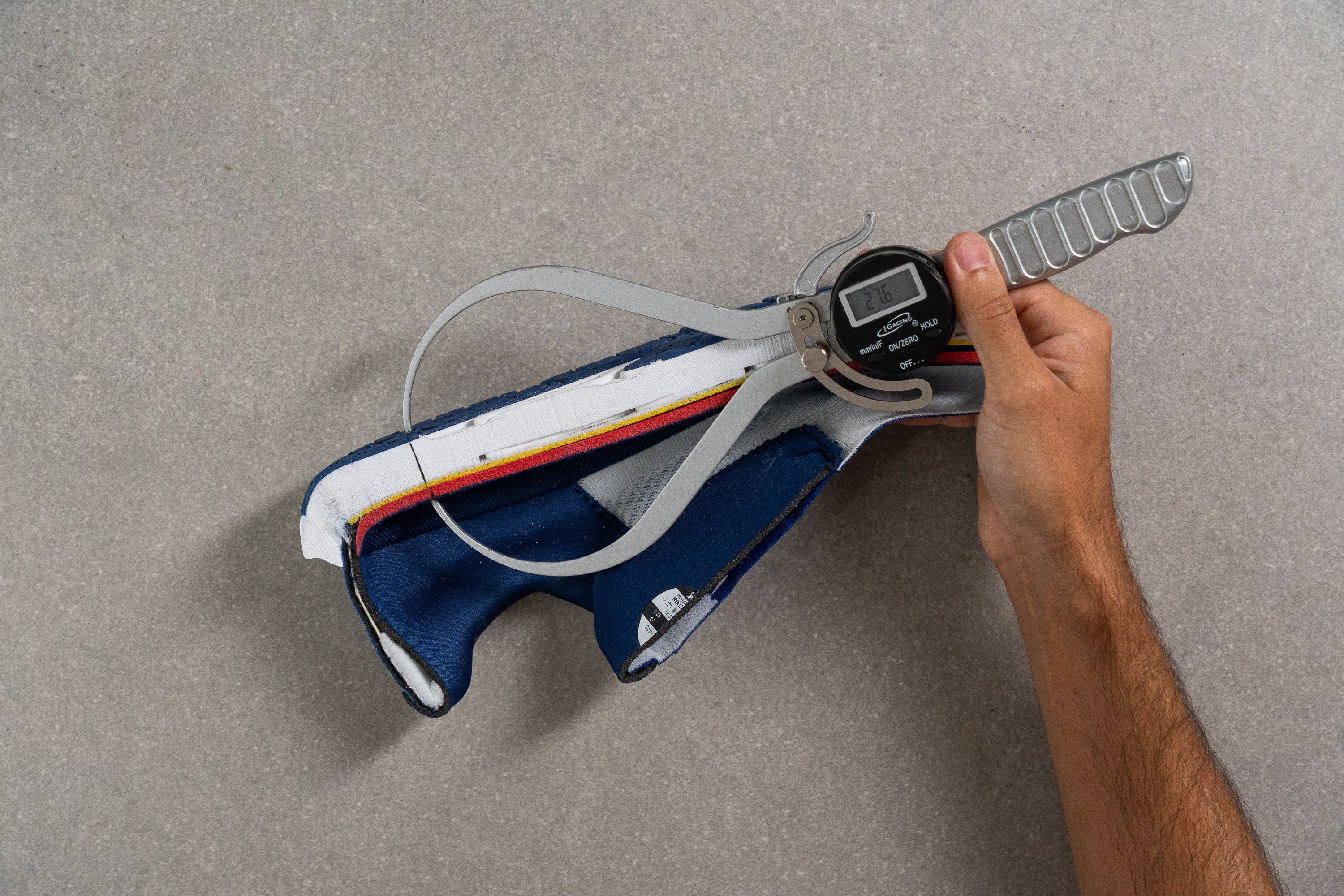
| Paradigm 7 | 27.6 mm |
| Average | 34.8 mm |
Forefoot stack
In the forefoot area, we measured a stack height of 27.5 mm. That's plenty for almost all runners and makes this a solid choice for a zero-drop stability shoe. It also serves as an excellent entry point for those new to the Altra brand.
If the forefoot stack gets too high—like over 30 mm—the risk of causing instability goes up a lot.
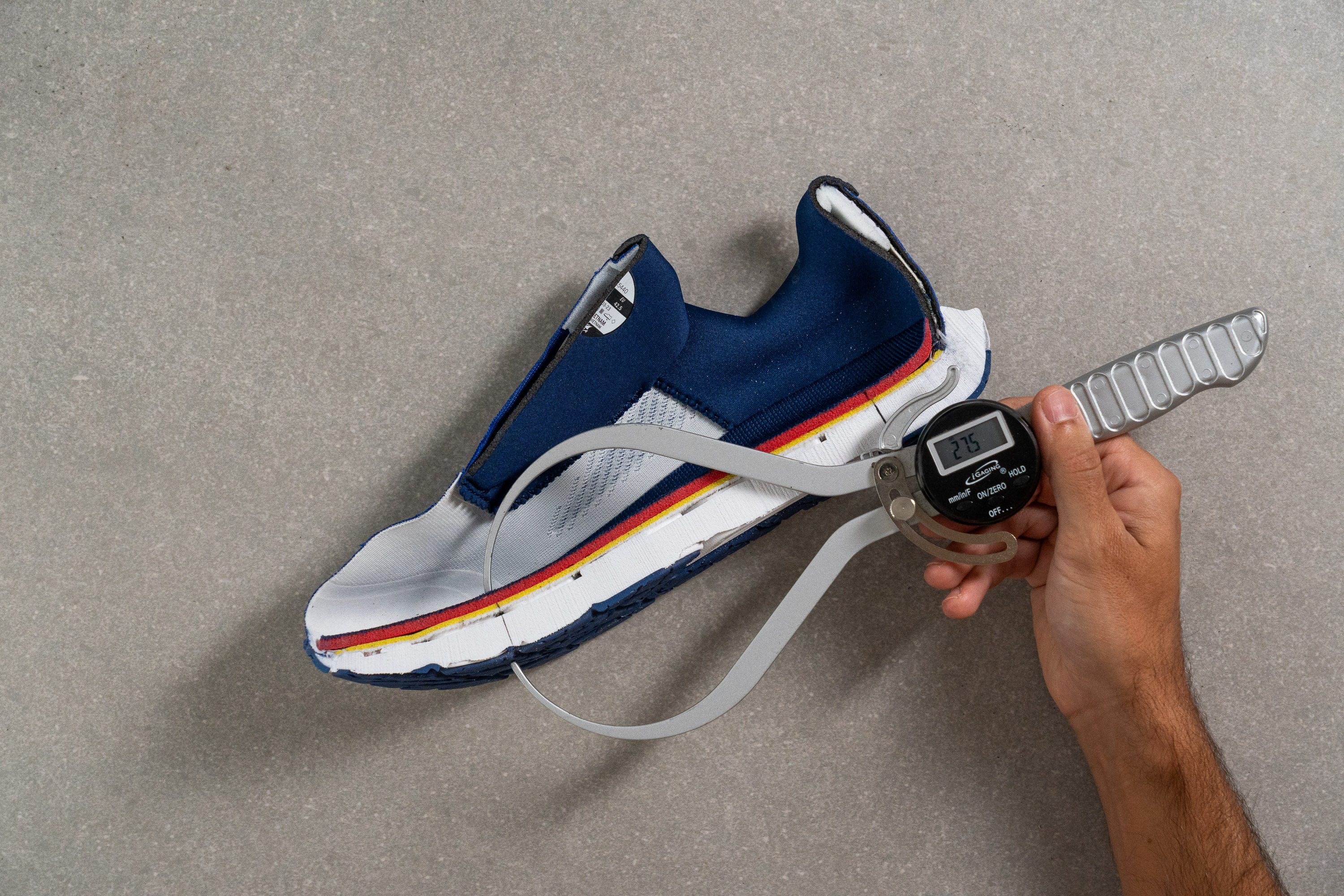
| Paradigm 7 | 27.5 mm |
| Average | 26.2 mm |
Drop
Altra is famous for making zero-drop shoes, and the Paradigm 7 is no different. We measured a tiny 0.1-mm drop in this shoe. That's basically zero when you consider small variations in manufacturing. So, you're getting what you'd expect!
Zero-drop shoes come with their own pros and cons. We cover this in more detail in our guide about heel-to-toe drop.
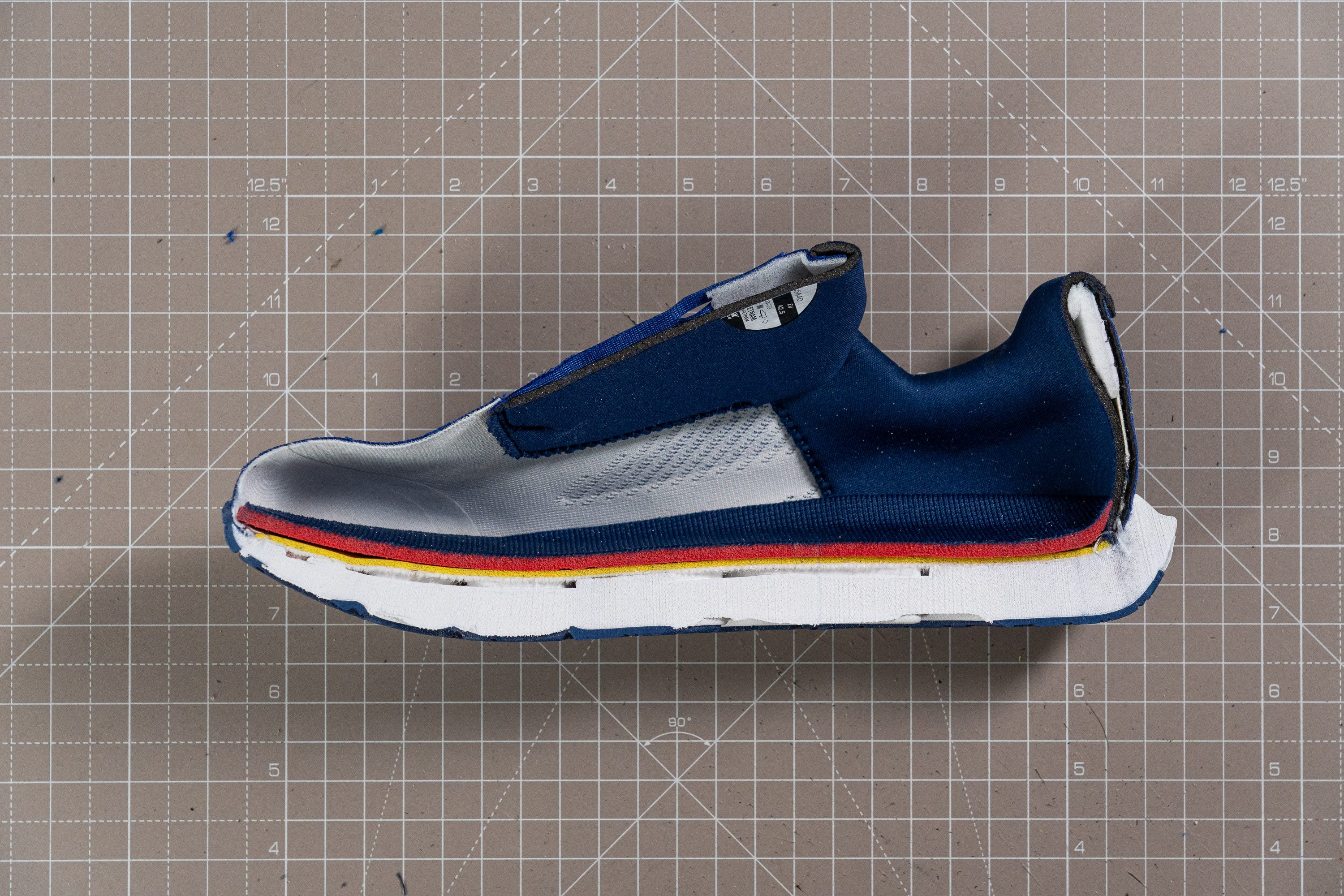
| Paradigm 7 | 0.1 mm |
| Average | 8.6 mm |
Midsole softness
Altra had a variety of midsole materials to pick from and they chose to go with Ego Max. This is a mix of EVA and TPU that feels comfy but not overly soft. That's actually a good thing for a shoe designed for stability!
We measured the softness of the material at 19.4 HA using our durometer.
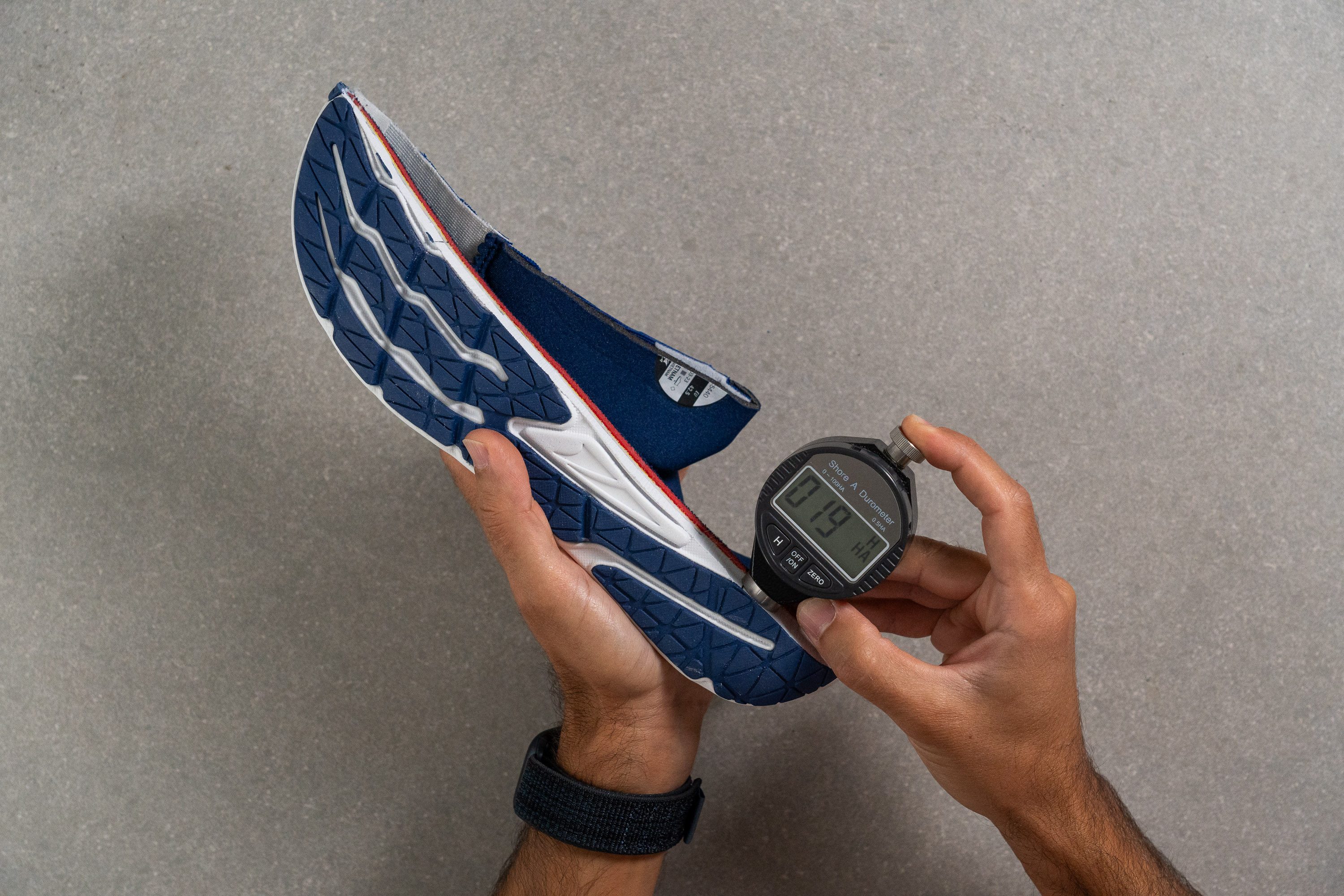
| Paradigm 7 | 19.4 HA |
| Average | 20.4 HA |
Size and fit
Size
Altra Paradigm 7 fits true to size (68 votes).
Internal length
The Altra sizing guide says the internal length of the shoe should be 270 mm. In our lab, we measured it at 268.6 mm. That's super close, confirming that these shoes really do fit true to size.
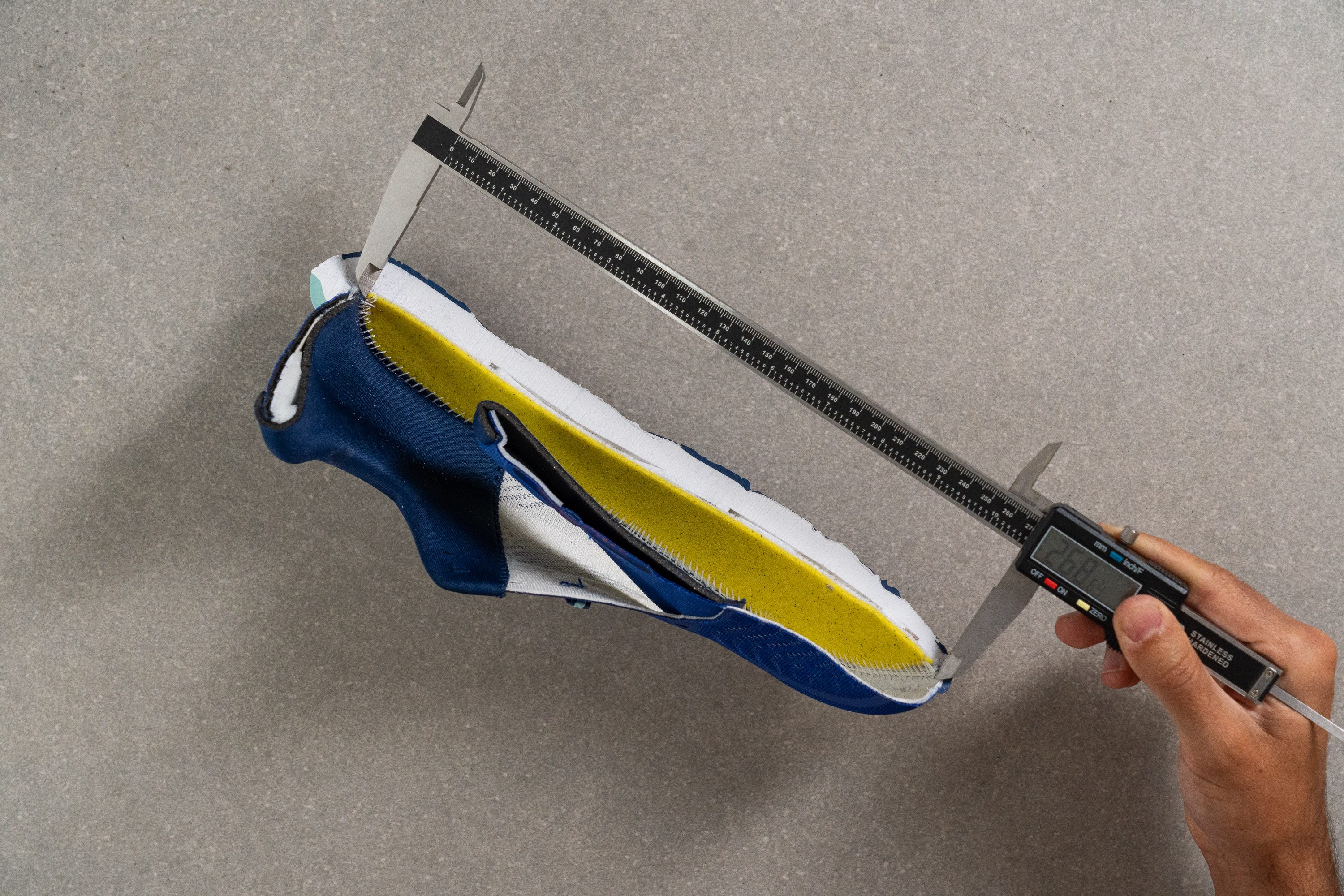
| Paradigm 7 | 268.6 mm |
| Average | 269.4 mm |
Width / Fit
The Paradigm 7 is built on Altra's Standard last, positioned between the Slim and Original options in terms of roominess.
After creating an exact replica of the shoe's interiors with our custom gel method, we discovered it is impressively spacious at 99.8 mm. And for those needing even more room, Altra offers a Wide size in select markets.
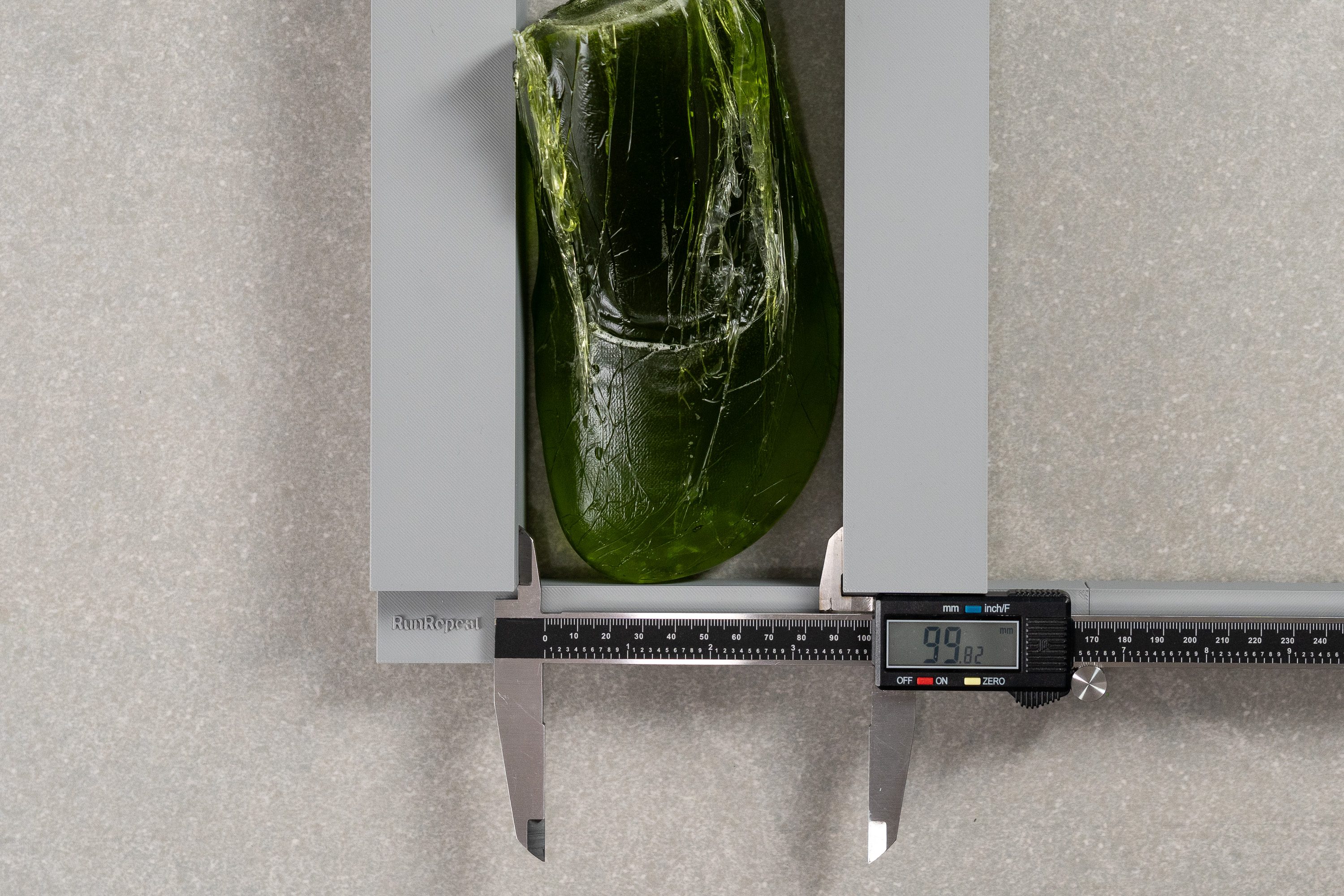
| Paradigm 7 | 99.8 mm |
| Average | 95.1 mm |
Toebox width
As with every Altra shoe, it’s the measurement of the big toe area where the anatomic design truly stands out. Measuring an impressive 81.7 mm, we found that no matter how much you love to splay your toes, the Paradigm 7 delivers unmatched room. It’s nearly 1 cm more than most daily trainers!
In our view, this feature is especially relevant for stability shoes like this one. Trust us, allowing your toes to splay and your feet to expand as much as possible plays a critical role in achieving a stable landing.
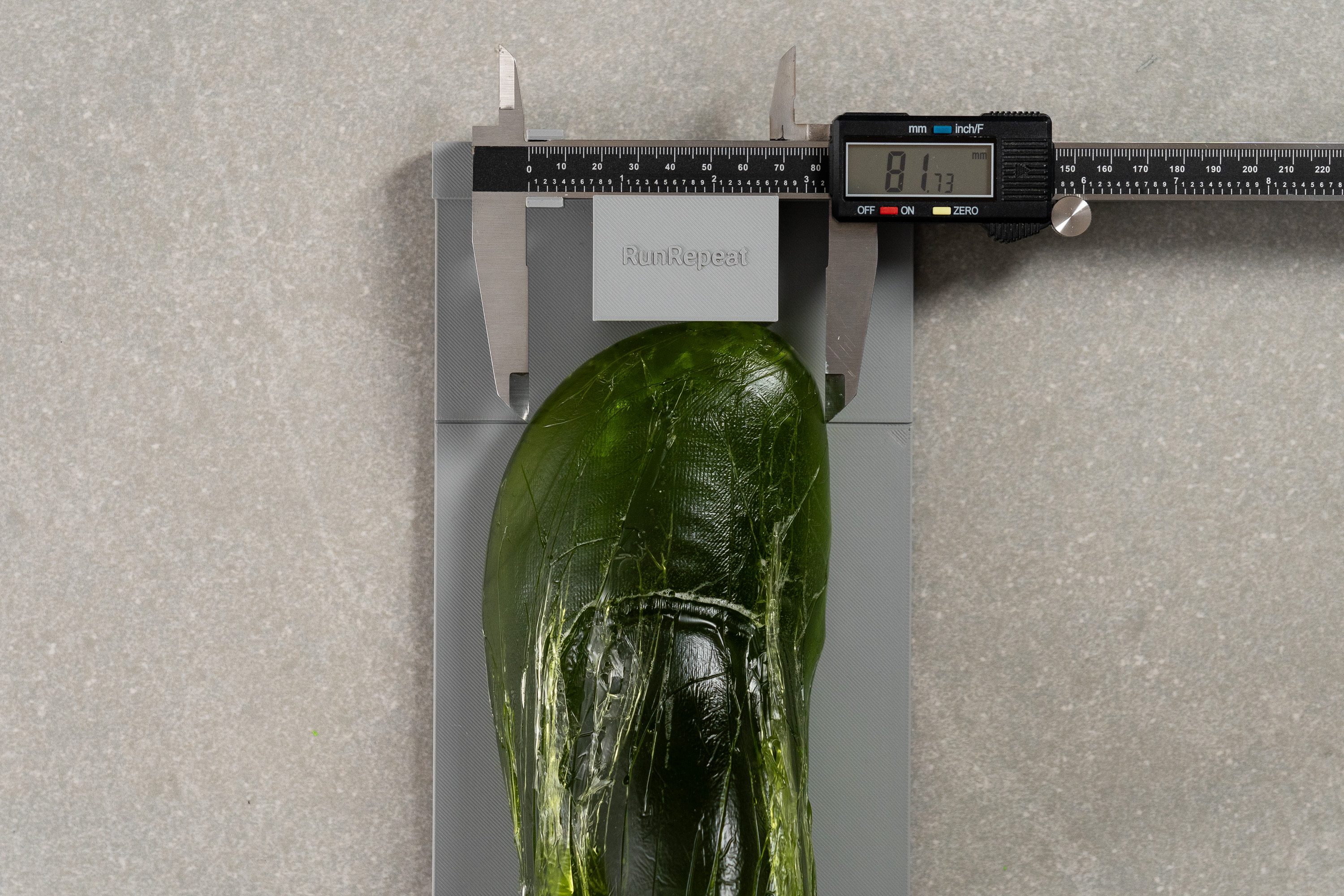
| Paradigm 7 | 81.7 mm |
| Average | 73.3 mm |
Toebox height
We measured the height at 29.9 mm—a great result for runners who dislike any pressure on their toes. On the flip side, snug-fit enthusiasts might find it less appealing, as the Paradigm offers mansion-like interior space.
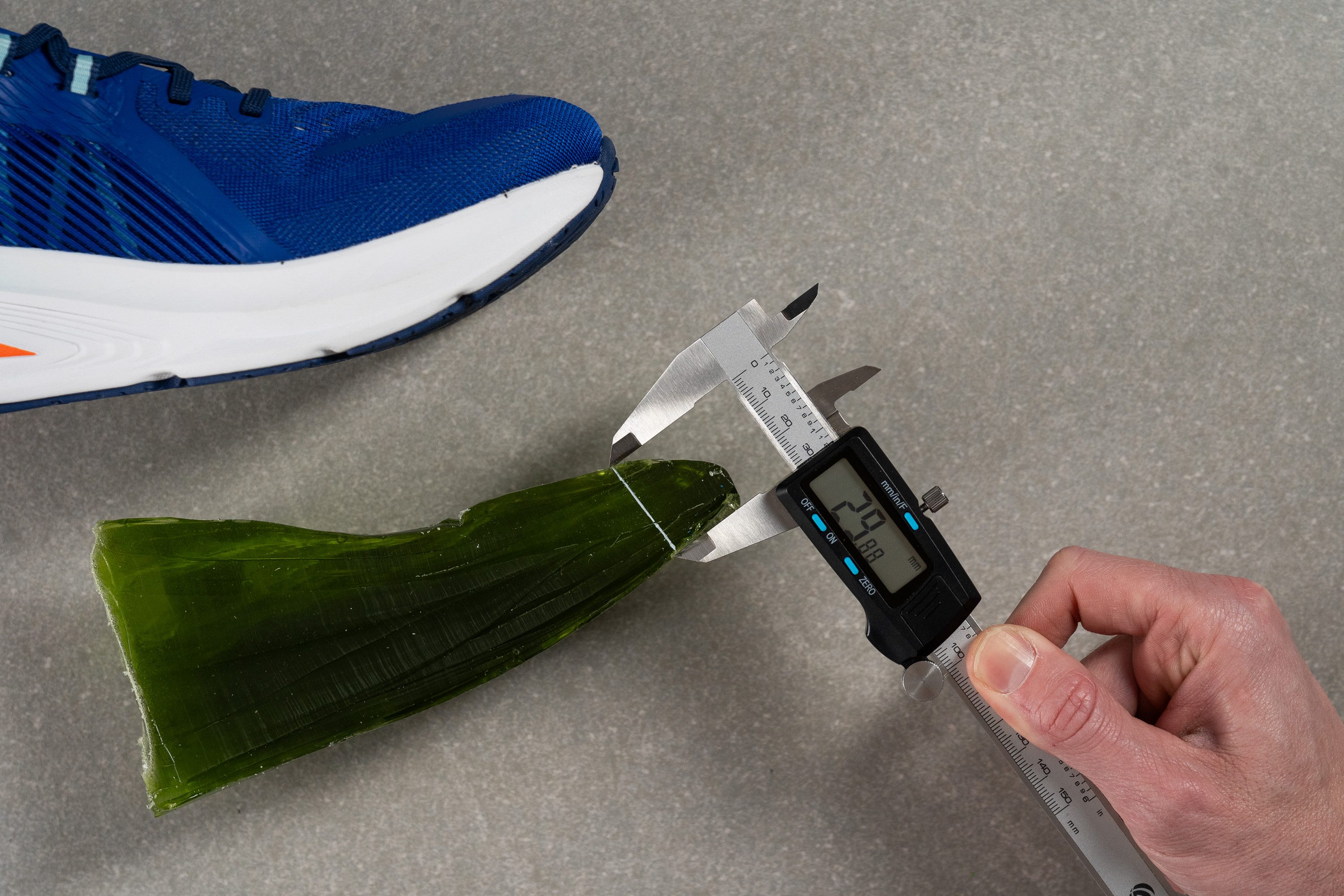
| Paradigm 7 | 29.9 mm |
| Average | 27.0 mm |
Traction / Grip
Traction test
We tested the Altra Paradigm’s outsole using our wet-condition lab protocol and recorded a 0.55 score. This makes it quite versatile, as it can handle dry and wet roads with ease.
For this reason, we can confirm that the outsole of the Paradigm 7 blends dependable traction with a stable, comfort-focused feel that suits daily runs.
| Paradigm 7 | 0.55 |
| Average | 0.49 |
Outsole design
The outsole includes several cutouts to boost flexibility and reduce weight, though they’re less aggressive than in other Altras. We also noticed solid rubber coverage on the medial side, offering added protection against early wear for pronators.
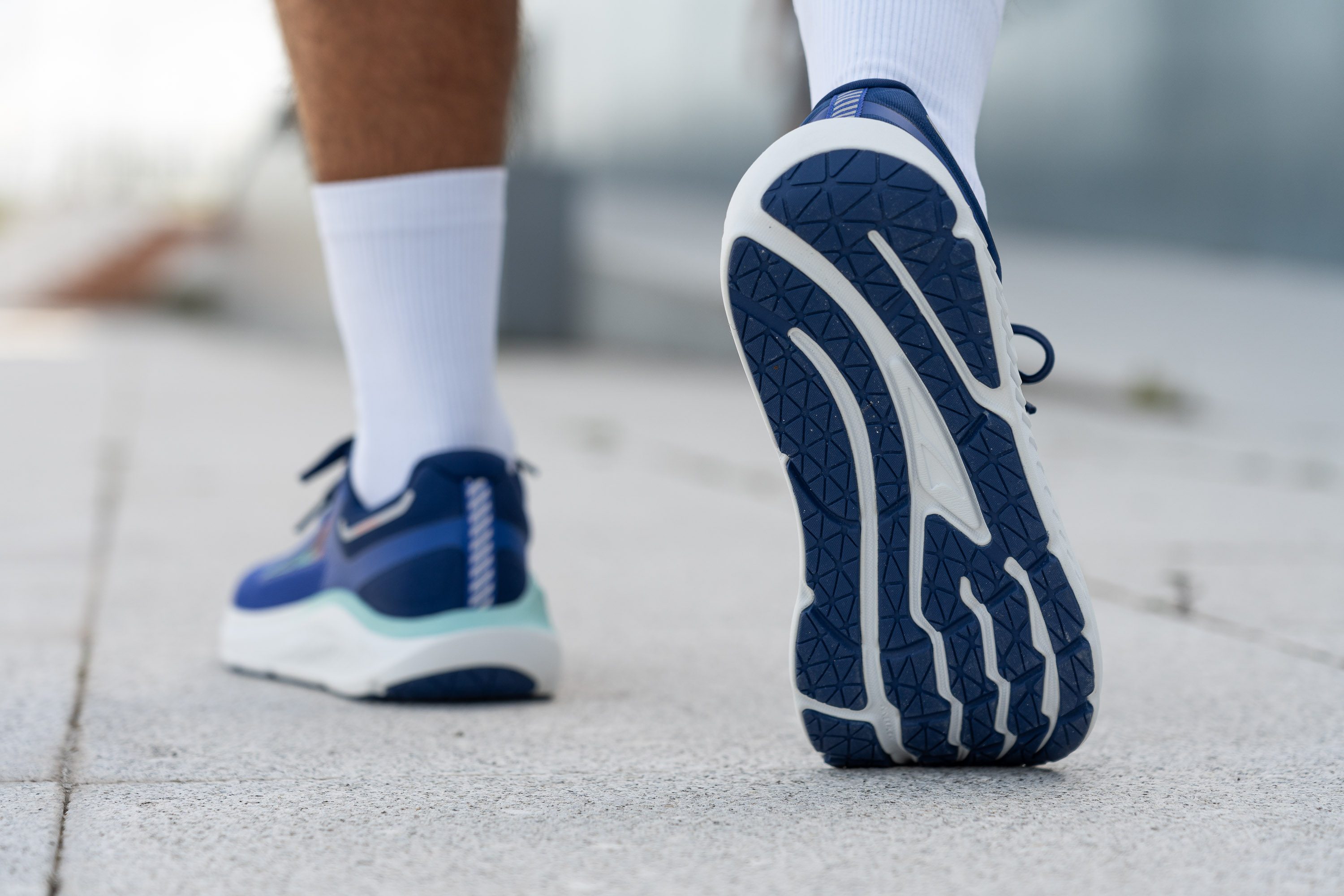
Flexibility / Stiffness
Built for comfort on daily runs or even just walks in the park, the Paradigm 7 is flexible. Those cutouts in the outsole really do their job.
In the lab, we found that it took just 12.5N of force to bend the shoe to a 30-degree angle during our stiffness machine.
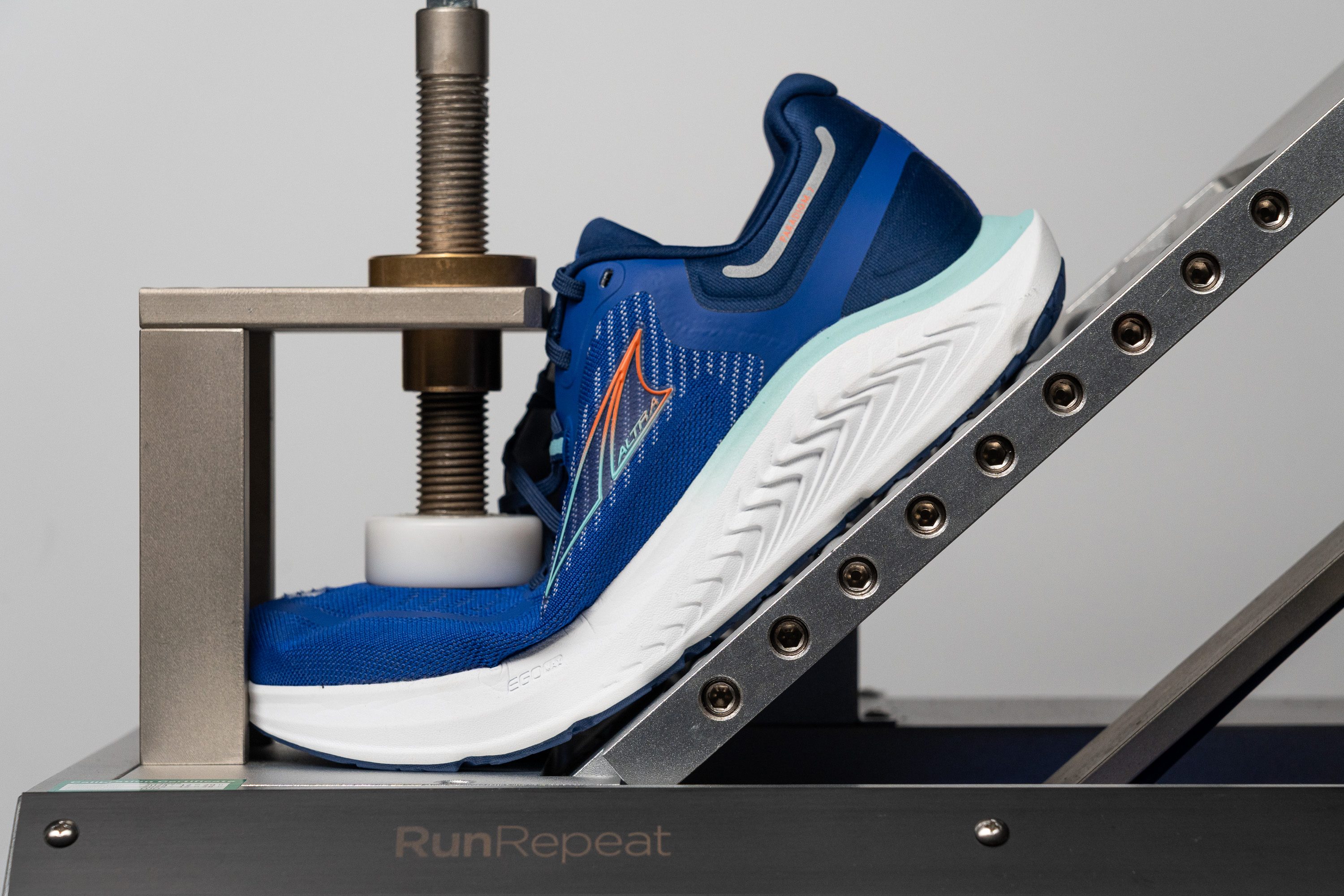
| Paradigm 7 | 12.5N |
| Average | 15.3N |
Stiffness in cold (%)
But when we tested it again in cold weather, things changed. We had to apply 36.1N of force to bend the shoe to that same 90-degree angle. So yeah, the cold definitely makes the shoe stiffer.
It's a 66.7% change, and that's not a small deal. It seems to come down to the shoe's EVA-based foam, as we said before.
For a £170 shoe, Altra really needs to step up their game here.
| Paradigm 7 | 67% |
| Average | 33% |
Weight
The strategy really worked wonders. Weighing in at a mere 9.3 oz or 264g, the Paradigm 7 is among the lightest stability shoes you can find in the market.
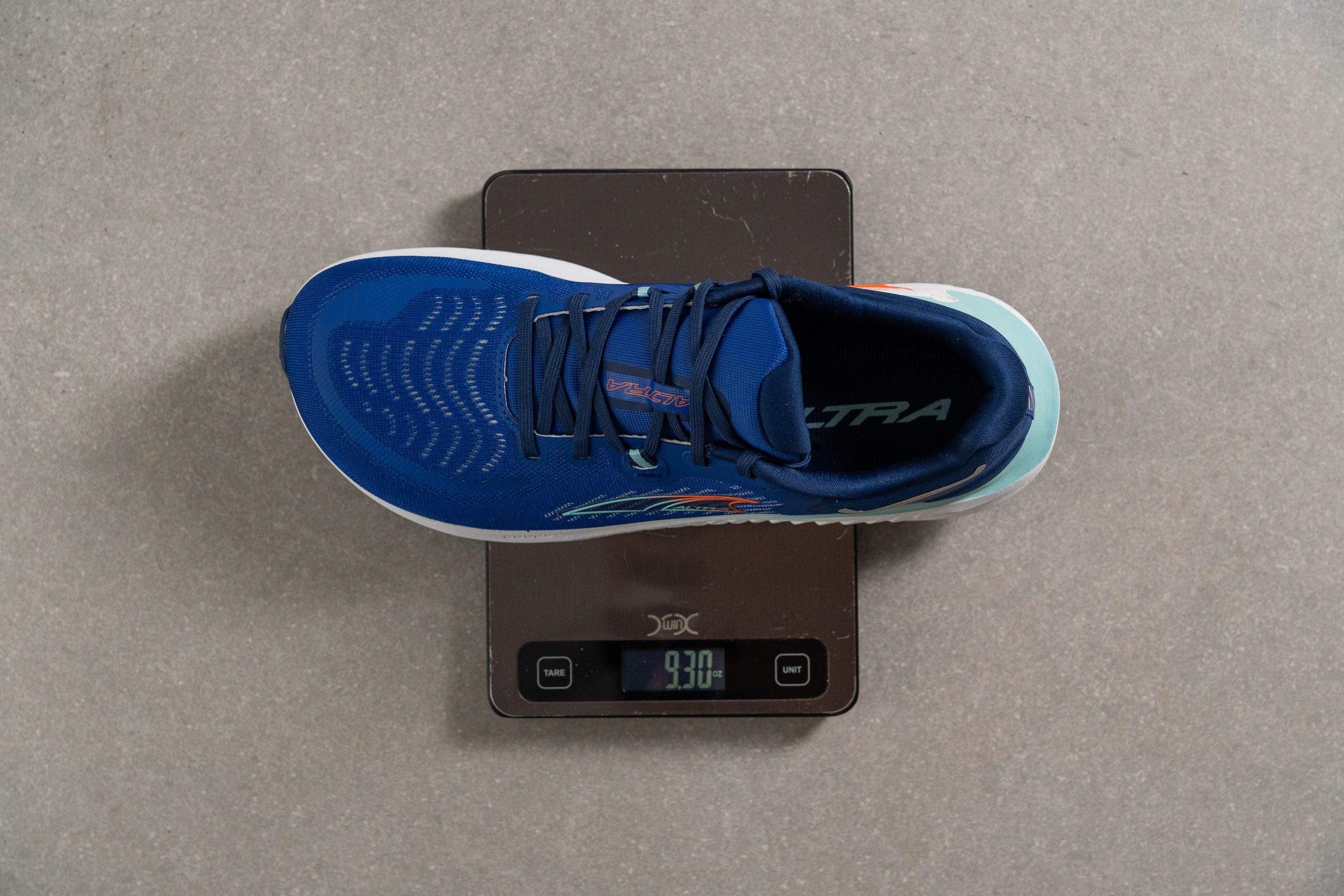
| Paradigm 7 | 9.3 oz (264g) |
| Average | 9.3 oz (264g) |
Breathability
If you're shelling out as much as £170 for a daily trainer, you'd expect it to have good breathability.
In our lab tests using a smoke-pumping machine, we were pleased to see that the Paradigm 7 scored a perfect 5/5 for breathability.
Under closer inspection, we observed that the shoe has multiple areas designed for better airflow. This is a smart design choice since many shoes only focus on the toe area for breathability.
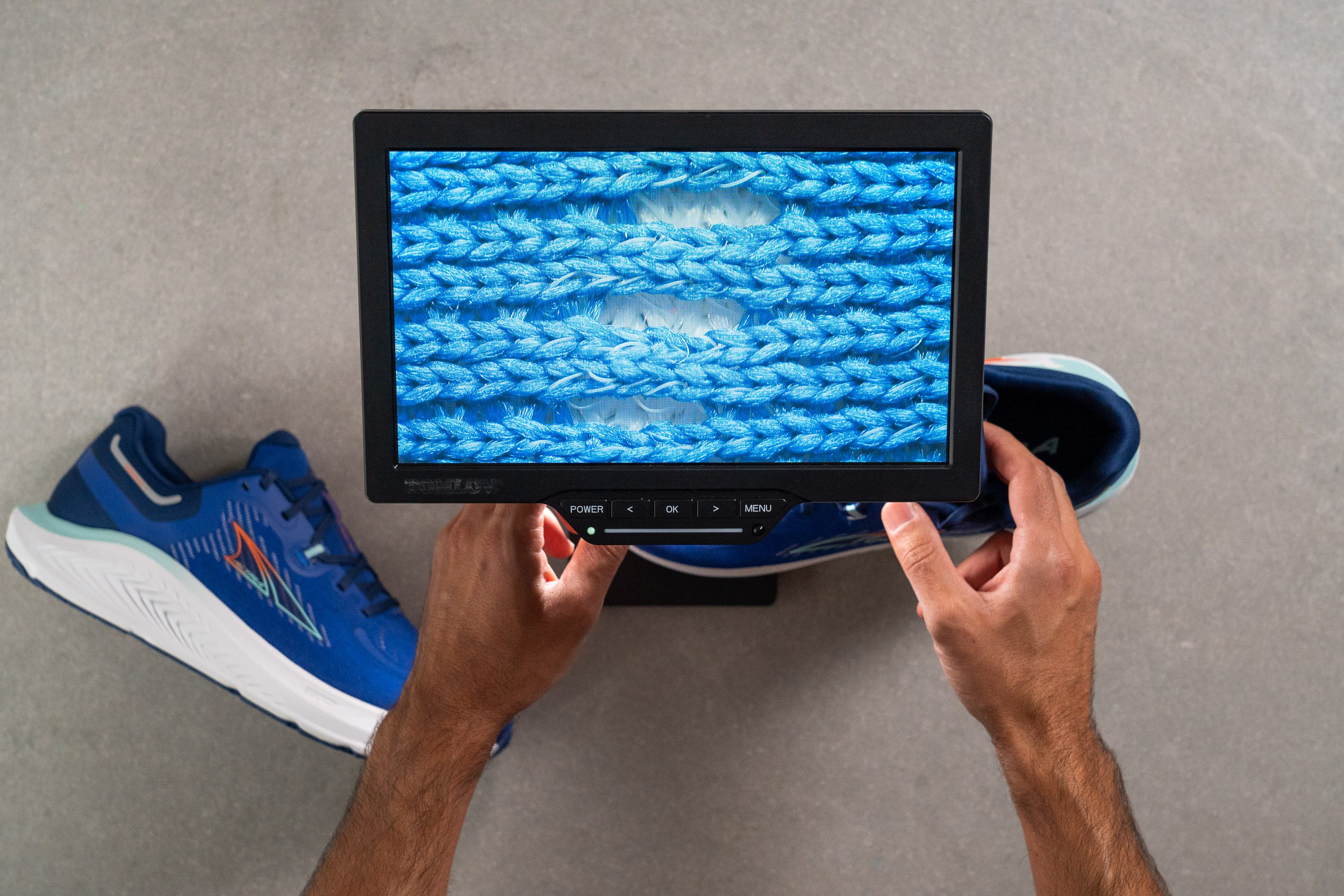
To get a better look at the toebox, we used our microscope.
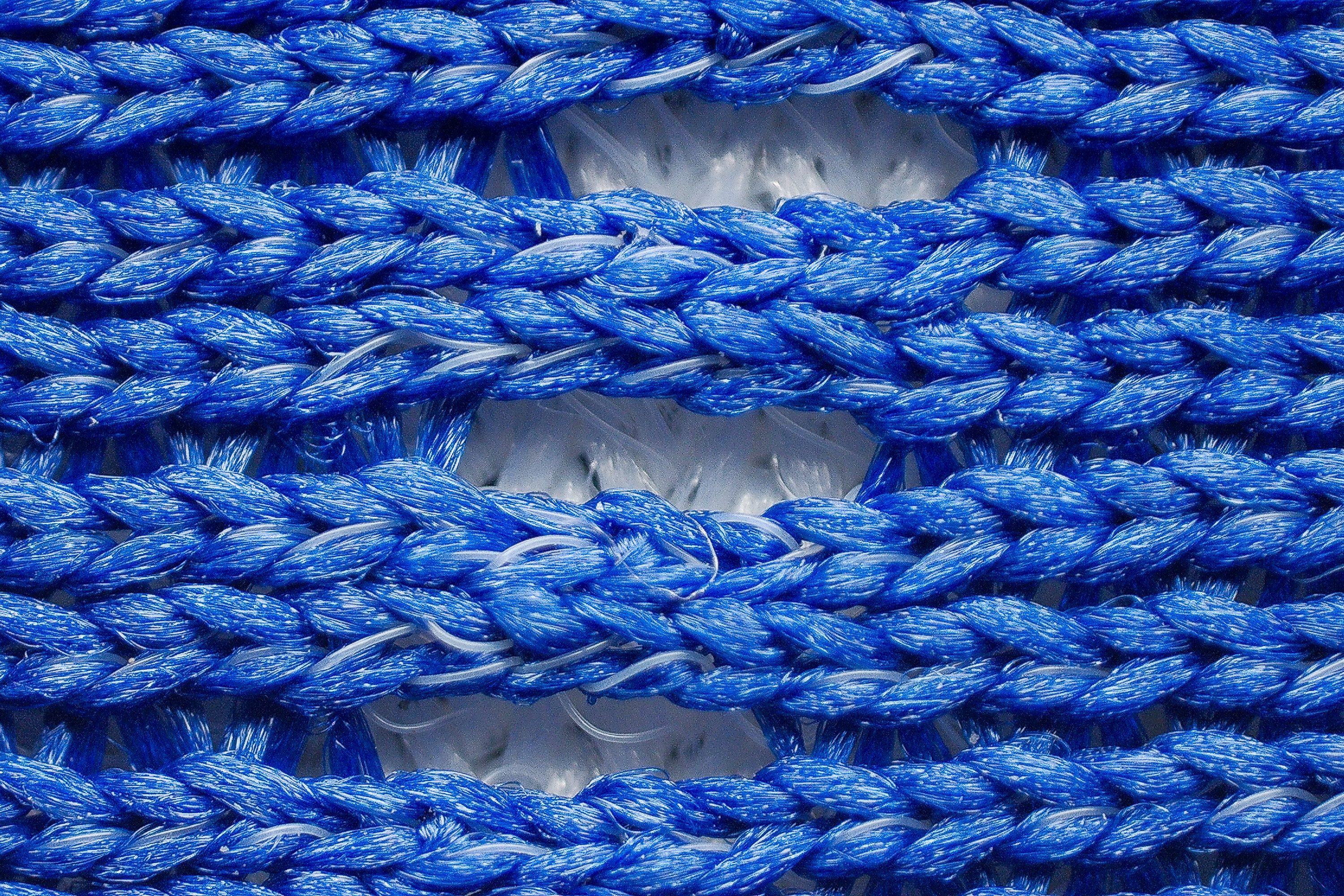
The Altra Paradigm 7 has large holes for maximum breathability, but they also added a white, thin fabric layer underneath for extra comfort and durability.
| Paradigm 7 | 5 |
| Average | 3.7 |
Stability
Lateral stability test
Designed to be a top-notch stability shoe, we expected the Paradigm 7 to give us a secure feel from the moment we stepped into it.
We're happy to say it totally lived up to our hype.
Torsional rigidity
Remember, this is a mild stability shoe, not a heavy-duty option. We see it as a daily trainer with some tweaks for extra support, and that's why it got a 3 out of 5 in our test at the lab.
Most runners will find it really stable, though. But if you have serious stability issues, you'll need something more specialised, like the Hoka Gaviota 5.
| Paradigm 7 | 3 |
| Average | 3.5 |
Heel counter stiffness
The same ideas come into play here. Shoes designed for people who need a lot of support usually get a 4 or 5 in this test. In contrast, we found that the Paradigm 7 scores just 2 out of 5, putting comfort ahead of stability.
We found that the absence of plastic in the heel cup makes the shoe's heel flexible. To put it simply, it's not so much a stability-focused daily trainer as it is a daily trainer with some added stability.
| Paradigm 7 | 2 |
| Average | 2.9 |
Midsole width - forefoot
We measured the midsole width and found it to be pretty average, coming in at 113.8 mm in the forefoot area. Making it any wider would have added unnecessary weight, so we think this is a good choice.
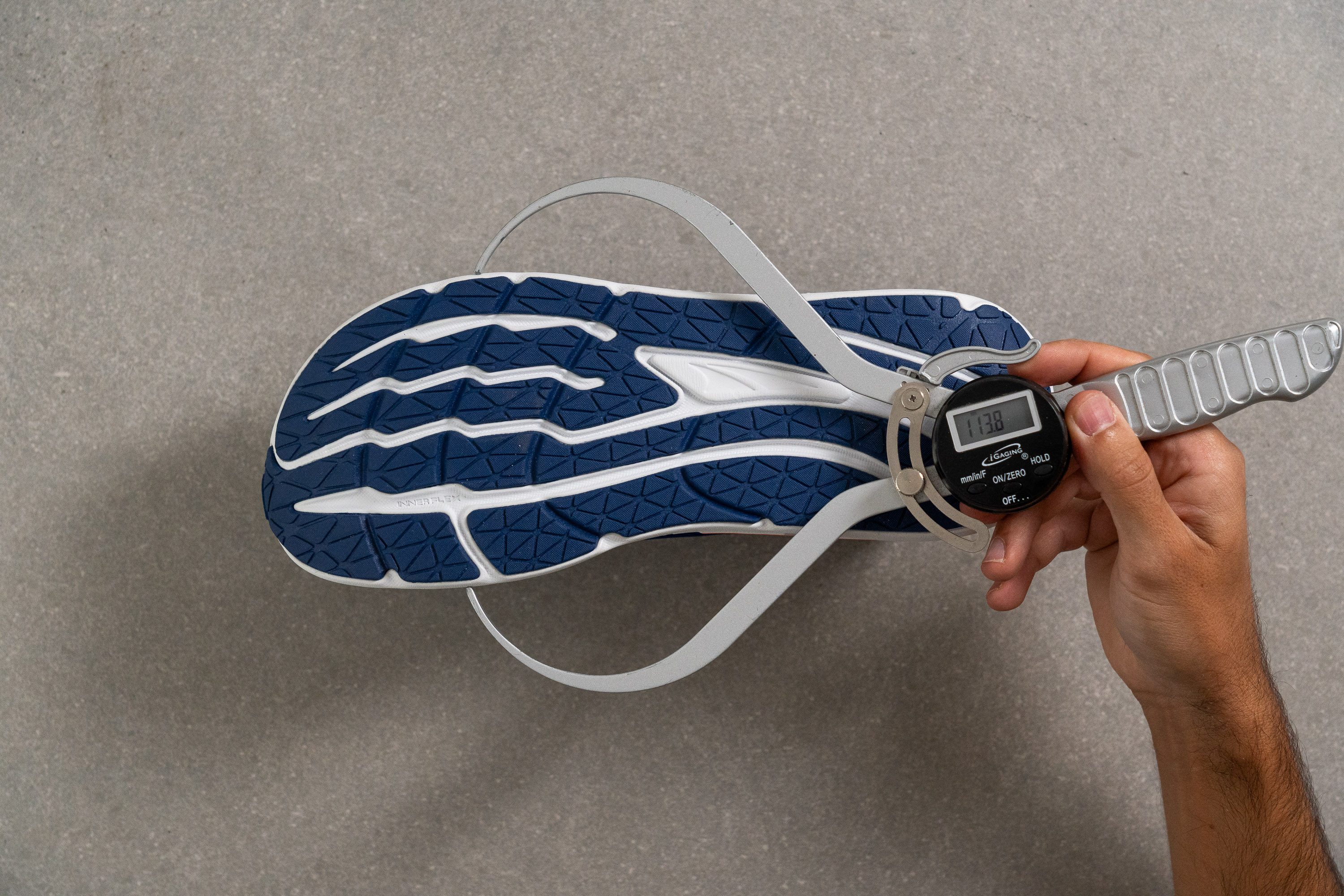
| Paradigm 7 | 113.8 mm |
| Average | 114.4 mm |
Midsole width - heel
We noticed that the heel is a bit wider than what you usually find.
Why did Altra do this? Well, since it's a zero-drop shoe, they understand that even forefoot strikers might land on their heels at times.
A wider heel (92.0 mm) provides that little extra stability for the Paradigm 7.
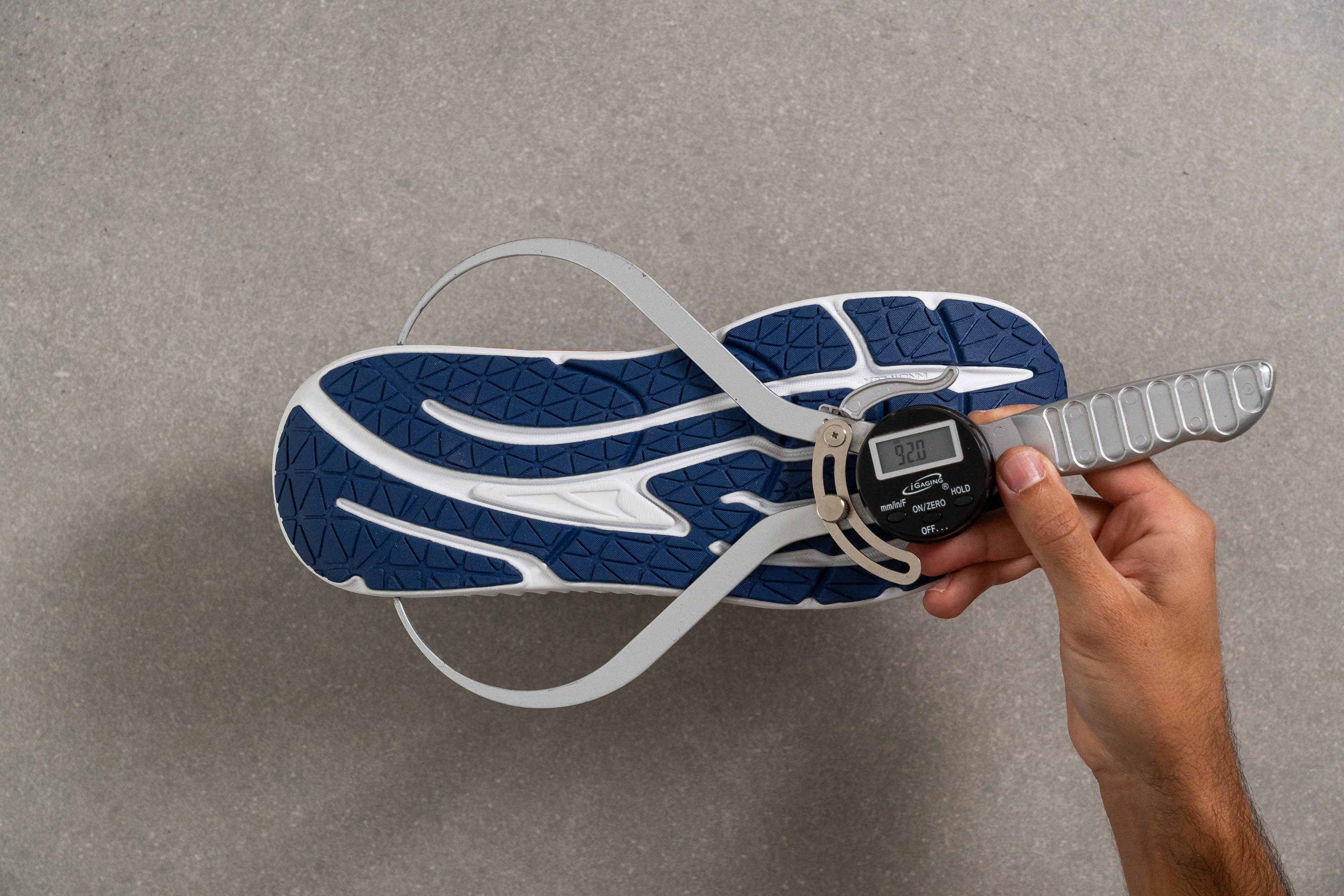
| Paradigm 7 | 92.0 mm |
| Average | 90.6 mm |
Durability
Toebox durability
After checking breathability, we turned our focus to durability by firing up the Dremel in the lab.
We observed that the toebox area held up quite well! The white fabric layer we talked about just before did its job. That's a 3/5 from us.
| Paradigm 7 | 3 |
| Average | 2.6 |
Heel padding durability
The heel didn't hold up as well as the toebox, scoring only a 2 out of 5 in our tests.
If you usually get holes in the heel of your running shoes, this is something to watch out for.
| Paradigm 7 | 2 |
| Average | 3.4 |
Outsole hardness
When we look at the outsole, the first thing we do is measure how hard the rubber is.

For the Altra Paradigm 7, we found that it scored an 83.6 on the hardness scale. This is a bit harder than what we usually see.
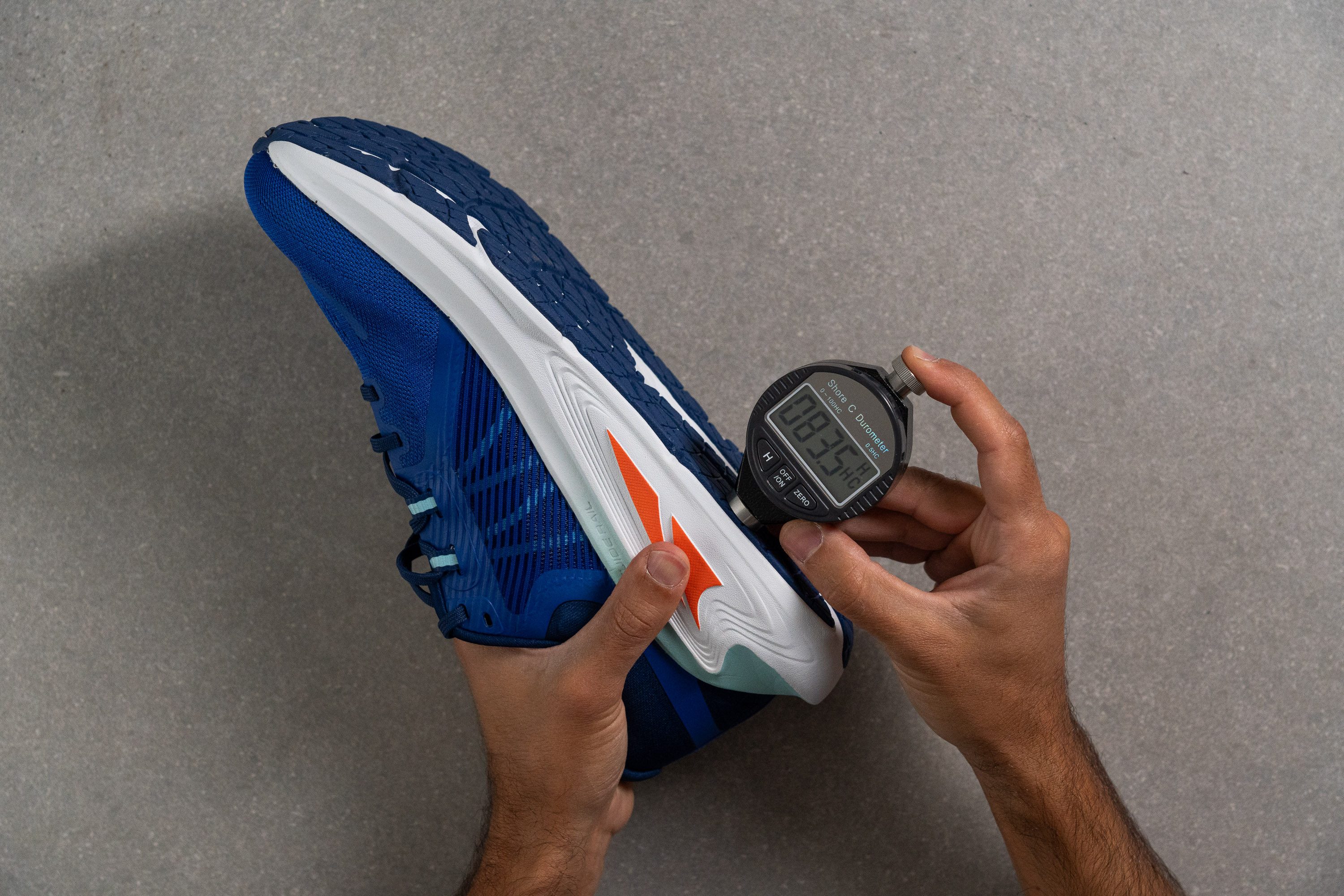
| Paradigm 7 | 83.6 HC |
| Average | 79.2 HC |
Outsole durability
We've confirmed that Altra uses a tough rubber for the outsole. So, did it hold up well?
We powered up the Dremel one final time and were thrilled to discover that the tool left only a tiny 0.5 mm dent. That's truly amazing and a clear sign this shoe is built to last!
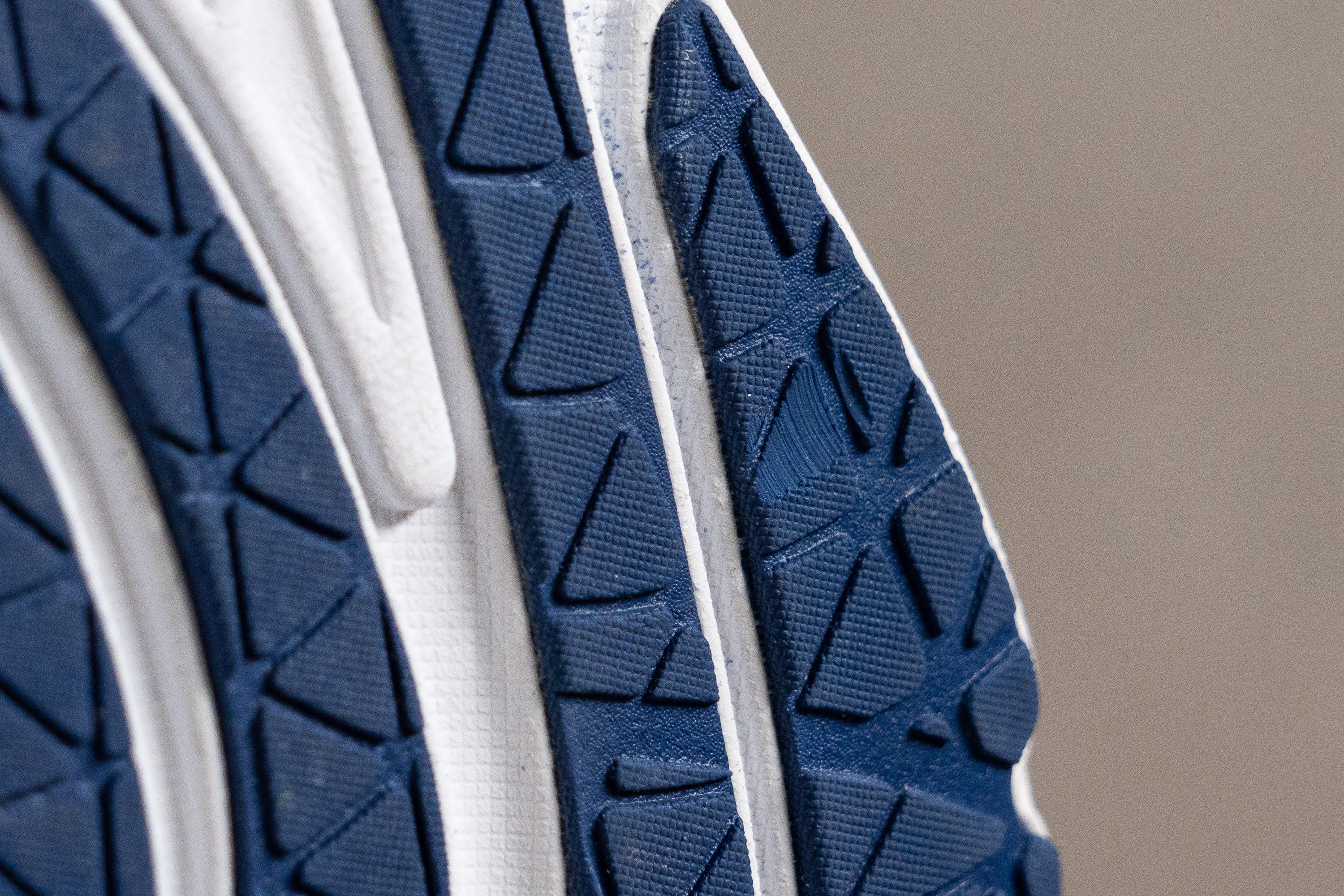
| Paradigm 7 | 0.5 mm |
| Average | 1.1 mm |
Outsole thickness
At just 2.7 mm, the rubber isn't super thick, but it seems like Altra's designers knew that was enough for a durable shoe. Why add unnecessary weight?
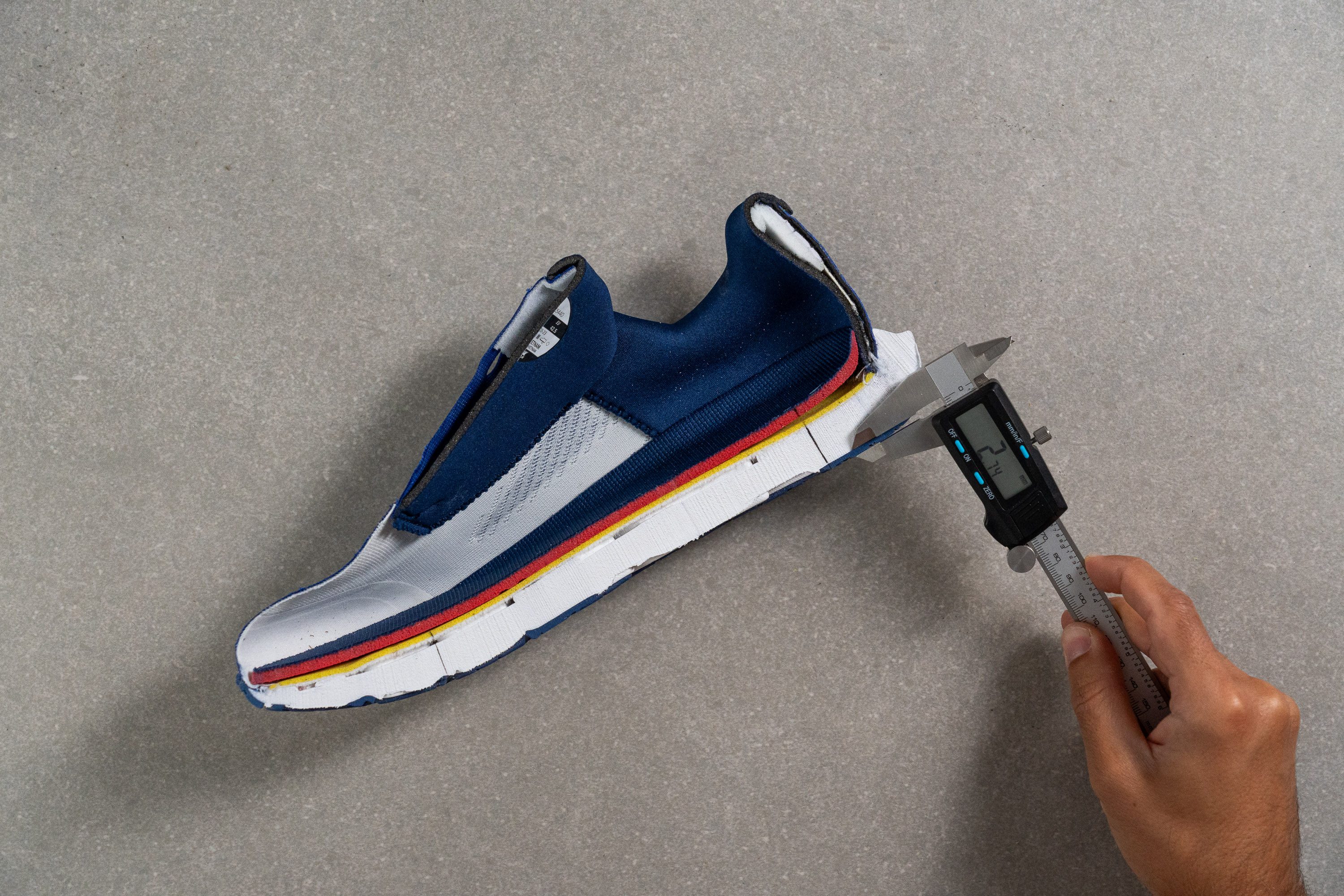
| Paradigm 7 | 2.7 mm |
| Average | 3.2 mm |
Misc
Insole thickness
We measured the insole and found it to be 4.4 mm thick. It's just a pretty standard insole.
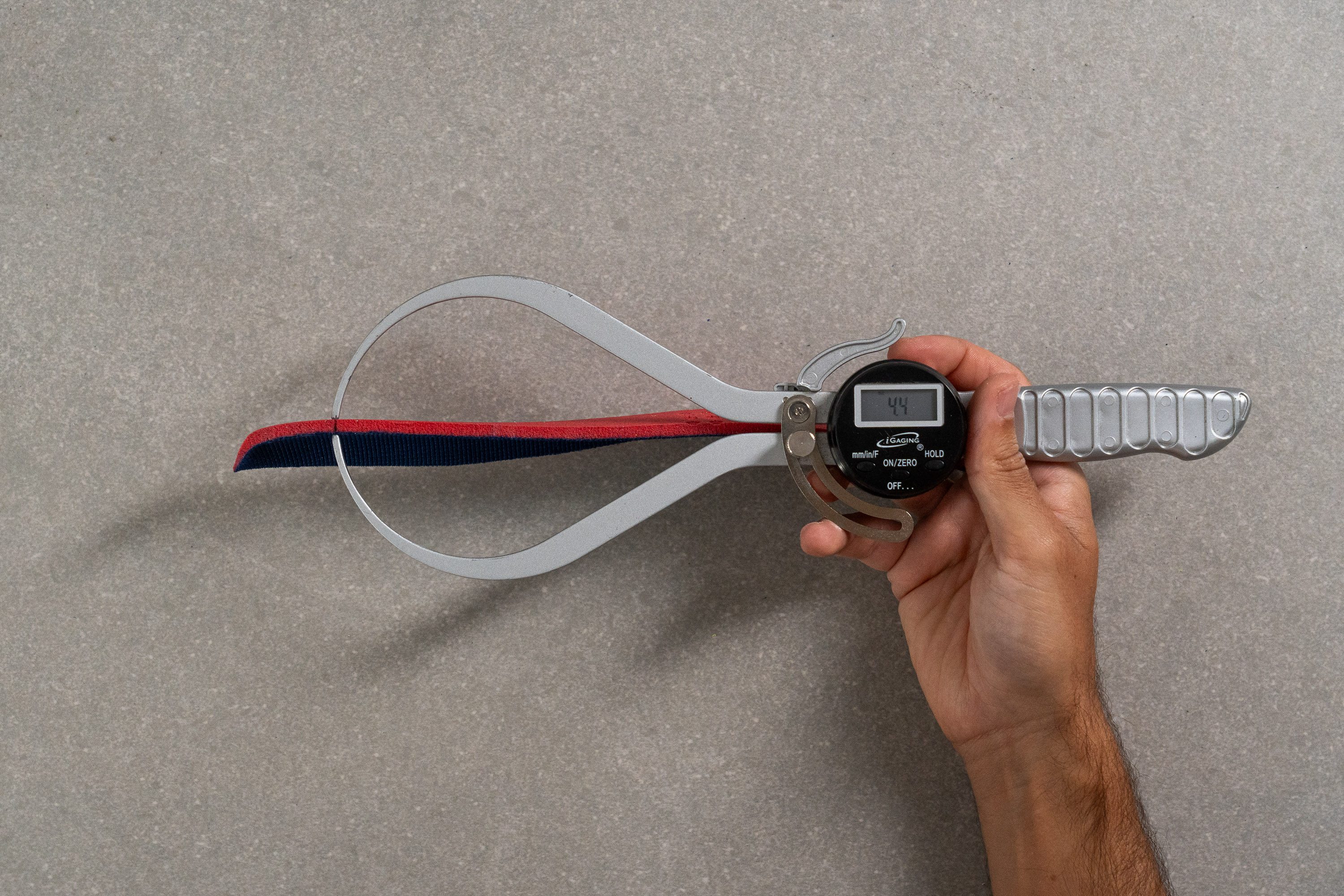
| Paradigm 7 | 4.4 mm |
| Average | 4.5 mm |
Removable insole
Taking out the insole was a breeze for us because it's not glued. But remember, like we mentioned before, this shoe has a unique shape. So, if you're thinking about swapping in an insole from another brand, it might not be a great fit.
If you've got custom-shaped orthotics made just for this shoe, though, you should be good to go without any issues.
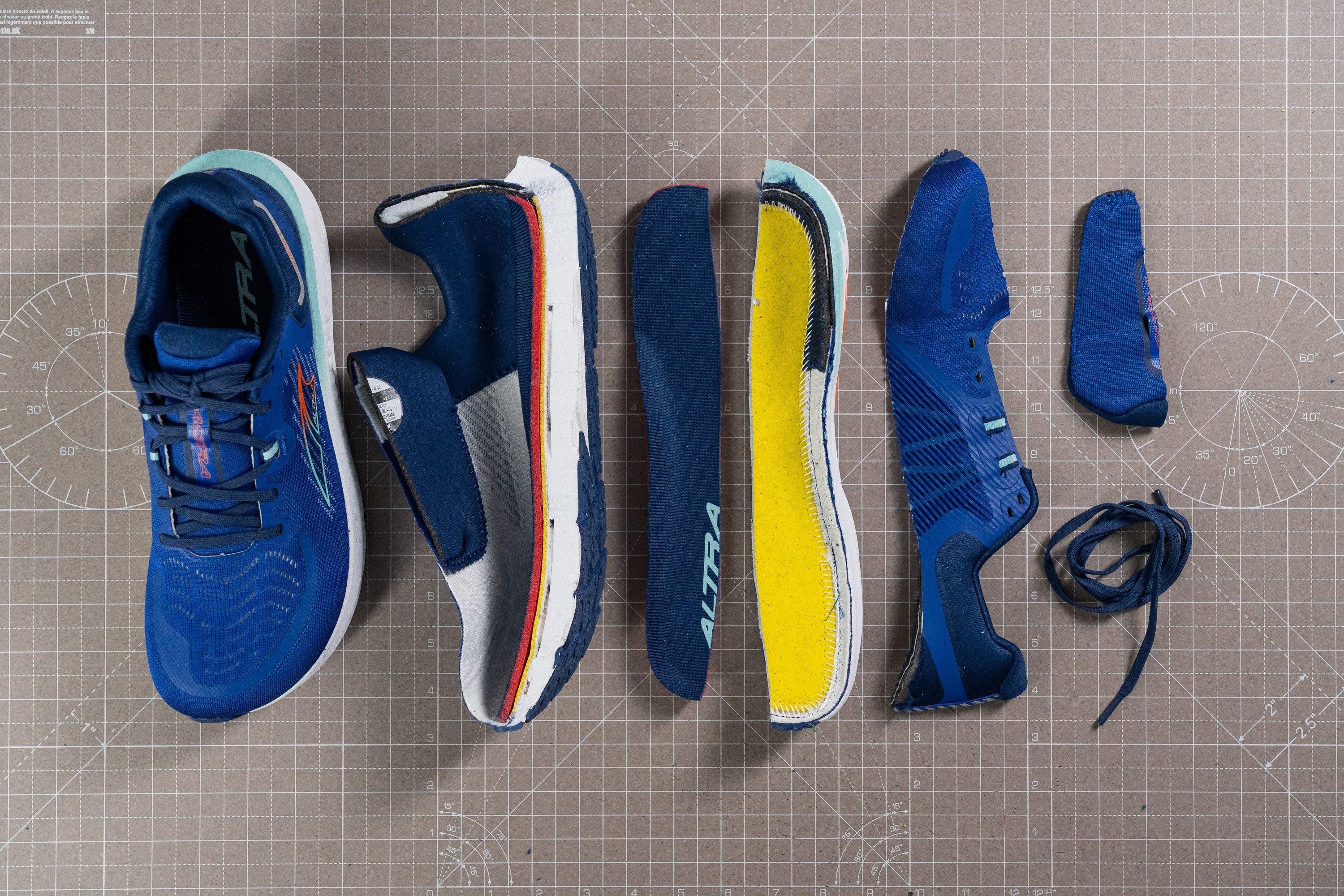
| Paradigm 7 | Yes |
Midsole softness in cold
We put the shoe in our freezer for 20 minutes and then tested its softness.
What we found wasn't promising—the softness level shot up to 29.8 HA. This means the shoe gets much firmer in cold conditions.
The softness jumps up by a whopping 53.8%, something you'll feel the second you start running.
But let's be honest, this isn't a shocker. Foams based on EVA always turn rock-hard in the cold.
| Paradigm 7 | 29.8 HA |
| Average | 25.0 HA |
Midsole softness in cold (%)
We put the shoe in our freezer for 20 minutes and then tested its softness.
What we found wasn't promising—the softness level shot up to 29.8 HA. This means the shoe gets much firmer in cold conditions.
The softness jumps up by a whopping 53.8%, something you'll feel the second you start running.
But let's be honest, this isn't a shocker. Foams based on EVA always turn rock-hard in the cold.
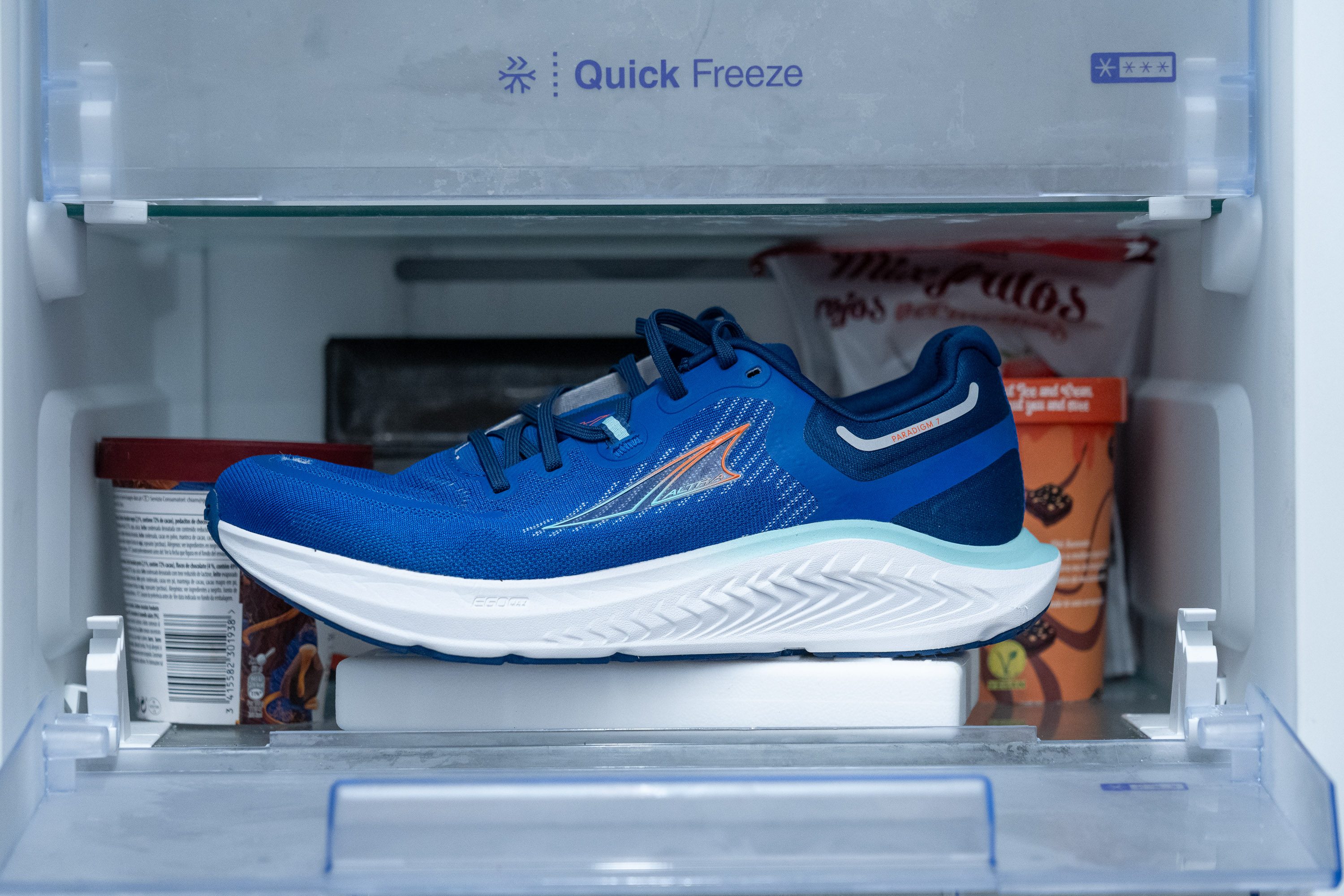
| Paradigm 7 | 54% |
| Average | 24% |
Reflective elements
We're glad to see that the Paradigm 7 comes with some shiny reflective pieces. Honestly, that should just be standard stuff in any expensive daily trainer!
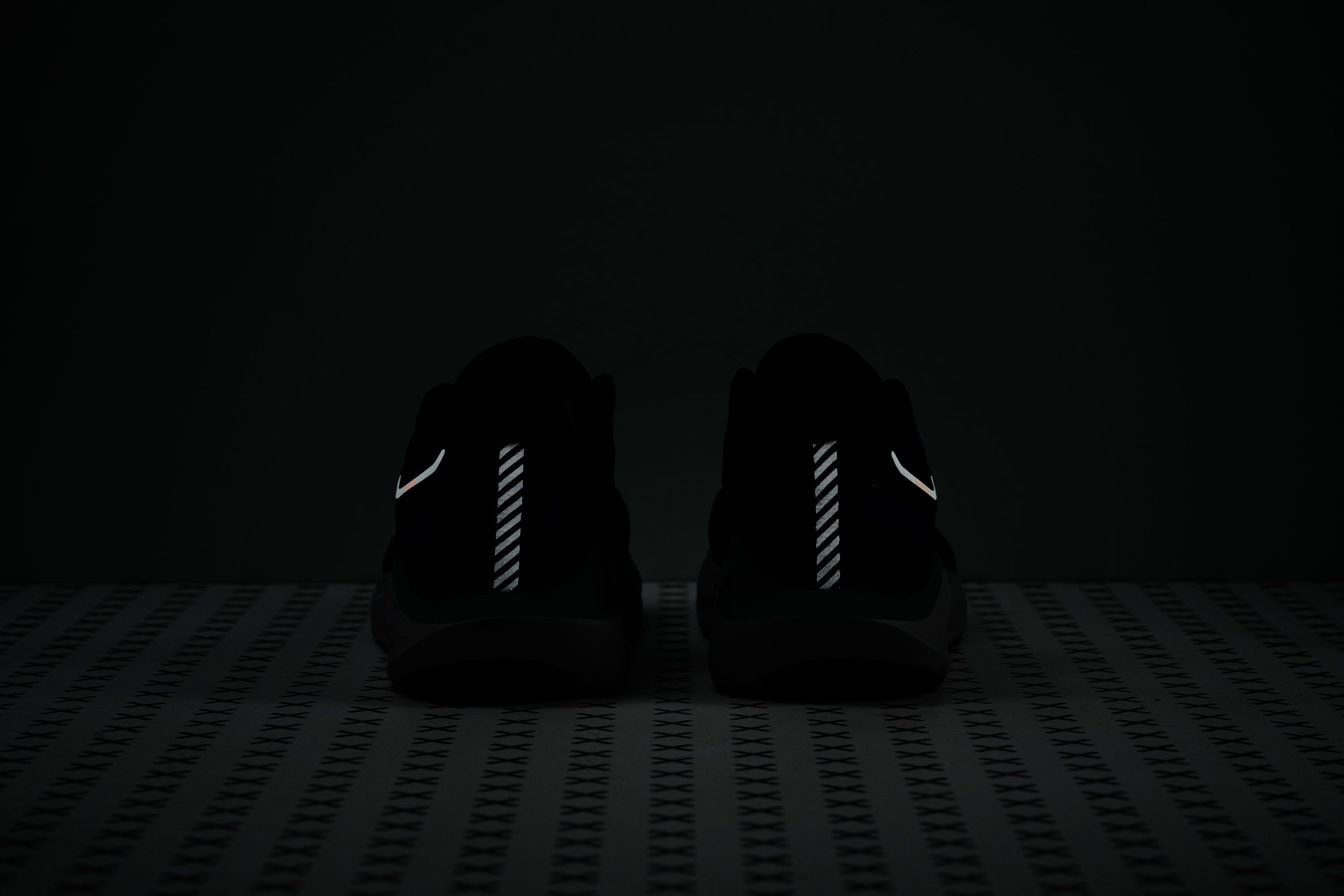
| Paradigm 7 | Yes |
Tongue padding
The tongue has a good amount of padding at 5.6 mm. This keeps the top of any foot nice and comfy!
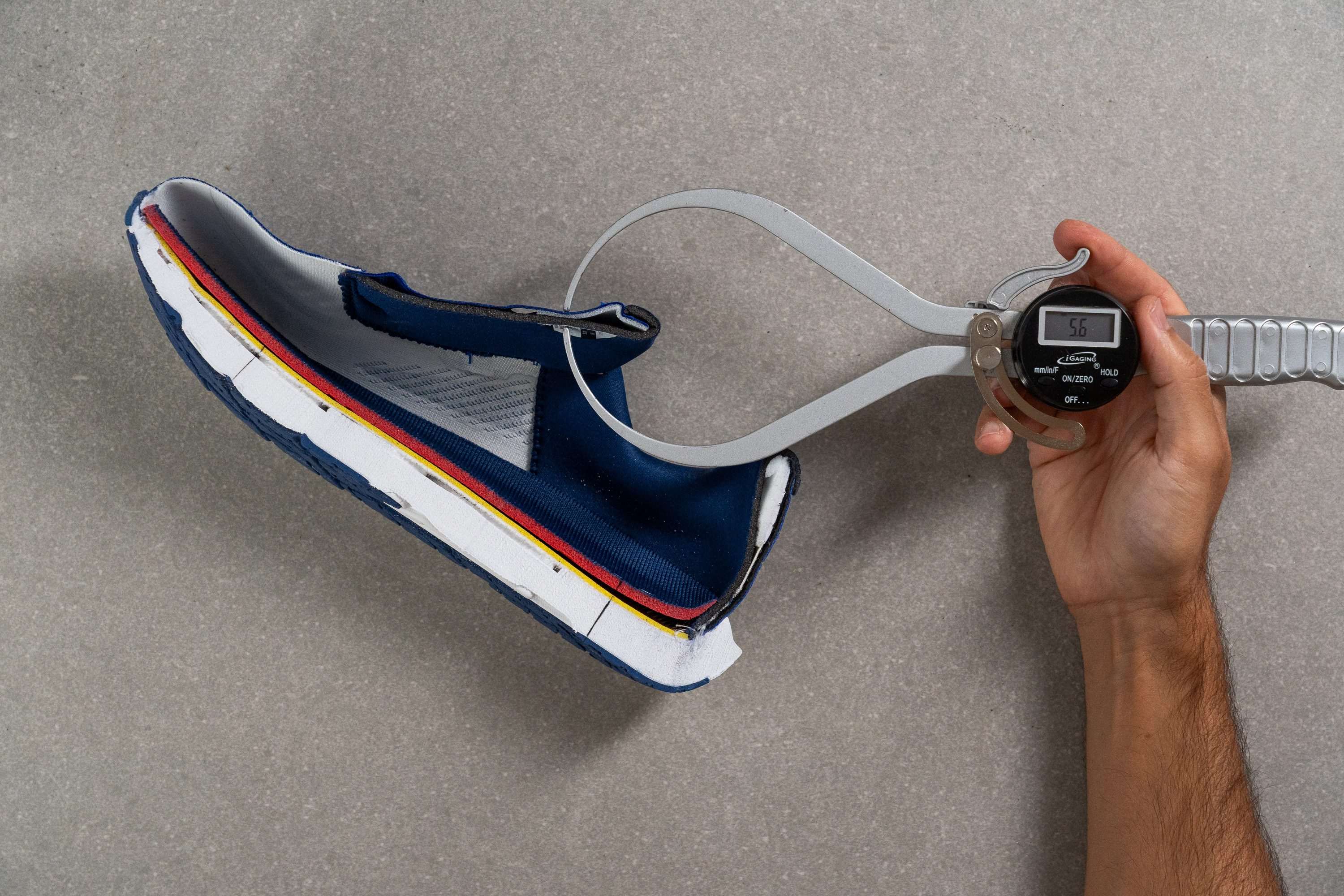
| Paradigm 7 | 5.6 mm |
| Average | 5.7 mm |
Tongue: gusset type
The tongue may move a little bit while running because it's not gusseted, meaning it's not attached to the sides of the shoe.
We think that's a letdown, especially for a shoe that costs £170. Hopefully, they fix this in the next version.
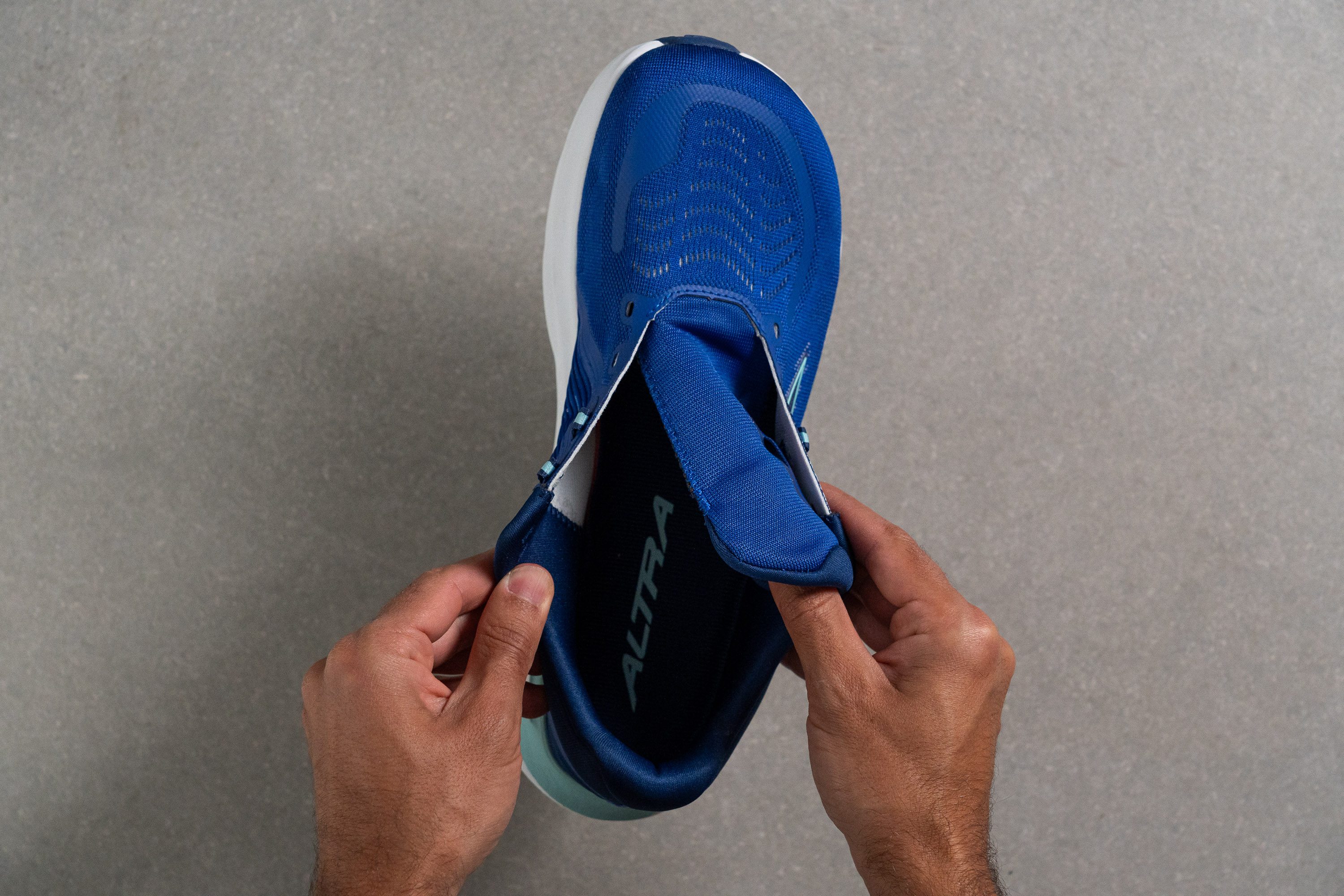
| Paradigm 7 | None |
Heel tab
The Paradigm 7 doesn't come with a heel tab, but we found that getting your feet into the shoe is still pretty straightforward and easy, even without one.
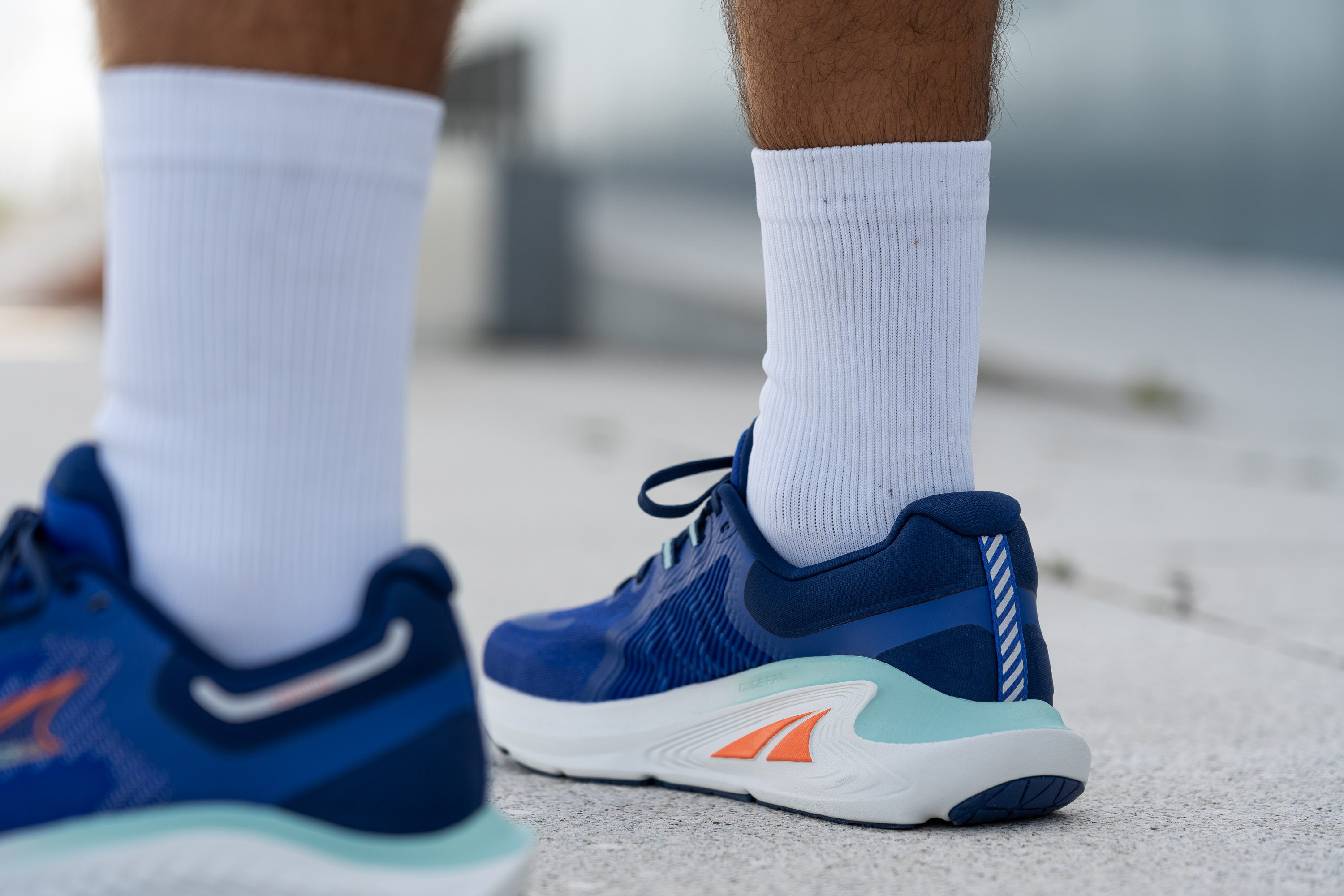
| Paradigm 7 | None |

